

Why Your RV AC Is So Loud: 6 Causes and Fixes
- One Comment
- Exterior , Maintenance
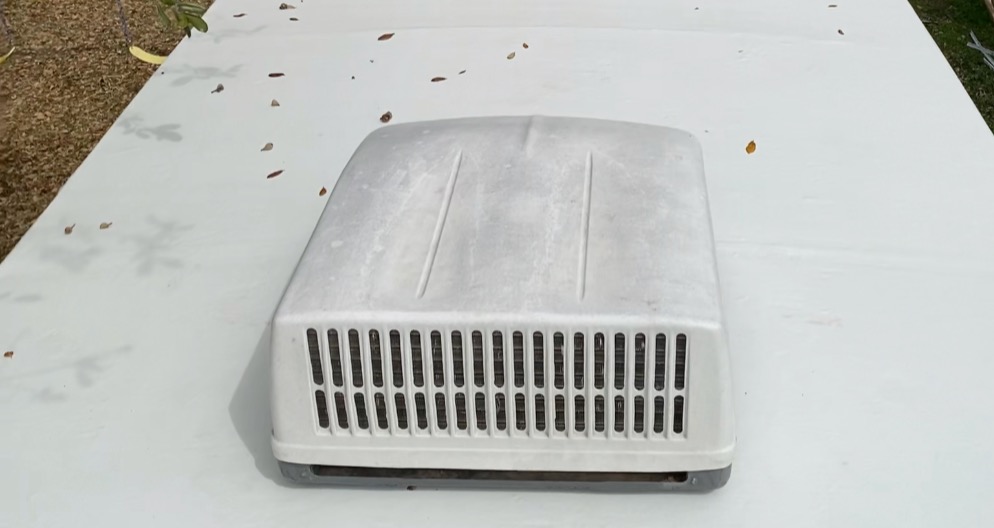
A clatter in the compressor or the jangle of a loose component often leads to annoyingly loud noise, and you would want to do everything in your power to reduce the racket that ensues.
Fortunately, there are ways to identify the cause for this and a few quick and easy ways to fix this problem and restore the peace in your RV.
Your RV AC could be loud because of loose or overtightened fittings, because the AC unit is old, or even due to the breakdown of the fan motor. Some easy ways to fix this problem are by installing an RV silencer unit, tightening the bolts, and regular maintenance of the AC unit.
If your RV’s AC seems to be on the brink of disrepair, then it might be a good option to consider investing in a new air conditioning unit.
But before you do that, you need to thoroughly inspect to see if the problem can be easily fixed.
This article will explore some of the common causes that lead to loud noise in an RV’s AC and look at some quick fixes.
6 Causes Why Your RV AC Is So Loud
As we see with all other HVAC systems, there is always the sound of a gentle hum that is ongoing.
The air conditioner in your RV is no exception, and it produces a certain amount of sound whenever it is turned on.
This sound is often produced by the clicking of the compressors or the fan blades as they whir, and most of these sounds are normal.
Nevertheless, you need to pay attention if this sound gets louder than normal; it could either mean that maintenance is overdue or that you need to check the air conditioning unit for any probable causes for this loud noise.
It could be something minor that needs a quick fix. Here are some causes of why your RV AC is making more noise than usual.
The AC Unit Is Old
One of the leading causes of the sound coming from an RV’s AC unit is probably because the AC unit is old and outdated.
In most of these cases, the AC unit is too old to be repaired, and sometimes even replacing certain parts of the unit or repairing them will not reduce the noise.
After a certain point, it only makes sense to consider purchasing a new AC unit if the older one is beyond repair or can only function by producing high decibels of sound every time.
Fan Motor Is Not Functioning Properly
Fan motors often are the culprit behind the loud noise in the RV’s AC. If an AC unit is rather frequently used, then the likely cause of the loud noise is because the fan motor needs some care and upkeep.
The problem gets compounded if the fan motor is of an old AC unit, as they tend to make a lot more noise.
Consider checking your fan motor thoroughly for signs of damage. When you are inspecting the tool, also consider looking up how old the fan motor is.
Remember, the older the motor and the more outdated, the more noise it is likely to make.
If the fan motor is too far gone, replacing it may be a good idea to stop the noise.
In case you cannot determine if the fan motor is damaged or whether it is old enough to be considered outdated, seek out the help of a professional to help you determine the fan’s condition.
If a replacement is required, it is still less costly than buying a brand new AC unit. You can do the replacement on your own as well.
All you will need is a basic understanding and know-how of electrical and mechanical appliances.
Loose or Overtightened Components
Oftentimes the real cause behind a really loud noise could be rather small.
A loose bolt here, an overtightened knob there – all these factors may contribute to a loud cranking noise coming from your RV’s AC.
Something as small as a loose nut or a screw can create an abnormally loud noise.
You will need to check the system thoroughly for any loose nuts or bolts in order to ascertain if that is the cause of the loud noise.
When you inspect the AC unit, remember to check each screw, nut, and bolt that is tightened in place.
You will be looking for any particular component that is screwed in too tightly.
If you find one, unscrew it ever so lightly that it is no longer unusually tight.
If you find any loose component, tighten that in place so that all the hardware components can now function as one unit.
When in doubt, always consult the user manual to figure out where the loose component of the air conditioning unit will have to go in.
In case you cannot figure out using the manual, consider taking the help of a professional to get it done.
Worn Out Rubber Cushions
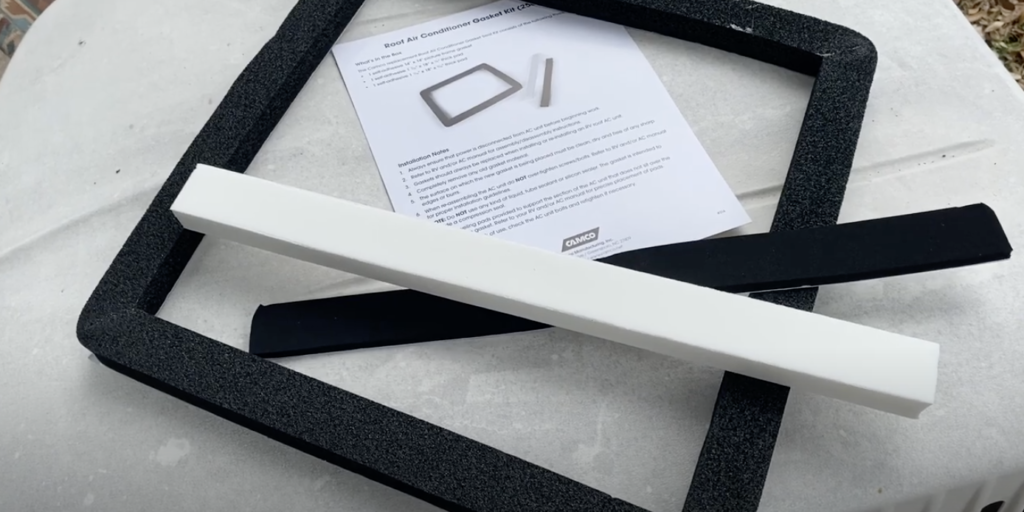
All air conditioning units come with rubber cushions installed inside to absorb any vibration caused by the various components and parts of the AC unit.
Over time and due to frequent and prolonged use, these rubber cushions may fray and wear out completely, leaving no buffer to absorb the air conditioning unit’s noise.
When this happens, and the rubber cushion has mostly worn out, it would seem that the air conditioning unit tends to produce noise that is more than usual.
However, that is not the case. It is still producing the same amount of noise as it produced earlier.
this time, there are no rubber cushions to absorb the noise.
Properly functioning rubber cushions are a great way to minimize noise.
It will absorb most of this sound produced by the AC when it is running, and because the rubber cushions do not take up extra space, they are also great for RVs.
To reduce the noise coming out of your AC, you would need to consider replacing the worn-out rubber cushions with new ones.
Sometimes the rubber cushions also get hardened instead of wearing out.
This, too, is unhelpful when it comes to deadening the noise coming from your AC unit.
Your AC Unit Is Overworked
All AC units are built to normalize the temperature in an enclosed space.
If the temperature outside is too hot, the AC unit will have to work much harder to make the air suitable for indoor circulation at the pre-set temperature.
The basic science behind its functioning is that it brings in outside air, processes it to bring it to the desired temperature level, and then distributes it for circulation in the enclosed space.
An overworked AC unit will begin to break down after a certain point in time.
Over time, there may be irreparable wear and tear, which may lead to loud noise emanating from the AC unit.
The loud noise is the AC’s way of telling you that it is in dire need of some respite from the heavy workload it is being subjected to.
In order to know whether your AC unit can withstand the temperature you are headed to, it is a good idea to consult the user manual that comes with your AC unit to know the maximum temperature in which your AC can function optimally.
Too much exposure to an incredibly hot climate may require certain parts and components of your AC unit to be changed.
Before you embark on making these replacements, make sure that you have a basic understanding of the electrical outlets and their functions. Enlist the help of a professional when in doubt.
How Your AC Unit Is Mounted
Often a tightly bolted AC unit may become the cause of unnecessary and loud noise in your RV.
They may be screwed so tightly to the RV wall that any vibration emitting off the AC as it runs will reverberate on the walls and cause a ruckus every time you run the AC.
You will have to check the mounting bolts to determine how tightly they are plugged into the wall.
If they seem to be too tightly screwed to the wall, then you may have to unscrew them slightly so that they are still stuck to the wall but not in a way that every vibration will be transmitted down the length of the wall.
In other words, the AC unit needs to be snug in place.
This is also a good time to check for loose screws and nuts because having even one loose nut or bolt may cause a key component of the unit to be displaced or dislodged, thus leading to more loud noises.
6 Ways to Make Your RV Air Conditioner Less Noisy
There are a few ways you can try to make your RV’s air conditioner less loud without having to purchase a whole new air conditioner.
Sometimes a simple and easy fix is all it needs to function properly and stop emitting loud noise.
You can do most of these fixes if you have a basic knowledge of how electrical things work.
However, if you are in doubt, it is always advisable to refer to the user manual for guidance or enlist the help of a professional who can assist you with getting the RV’s air conditioner fixed and restoring peace once again in your RV.
You can also watch this video below as a quick guide on fixing your RV AC quickly and with less cost:
Consider Installing a Silencer for the AC Unit
In case you cannot find any particular problem with your AC unit, then one way to eradicate the AC unit’s sound is by installing a silencer for the air conditioner.
There are lots of options available in the market today, and the installation process takes hardly 10-15 minutes.
The VIVOSUN 6 Inch Noise Reducer Silencer for Inline Duct Fan hinders the sound waves and allows the air to flow through the duct.
No products found.
A good silencer can lower the AC’s sound by approximately 10 decibels, bringing down the noise considerably and helping you restore the silence and calm within your RV.
Most of these silencers use a thick lining made of cotton placed inside the duct system itself so that the noise is muffled.
Having a silencer installed will ensure that you will never have to choose between staying cool or watching TV or between your sleep and the AC.
Regular Maintenance Is Critical to Avoid Unnecessary Noise
Regular maintenance of the AC unit is vital in maintaining the AC unit in top shape.
A small part that may have come loose, or minor damage in one part, if overlooked over a certain period, may lead to loud noises in the AC.
So, it is vital for the general upkeep and proper functioning of the AC unit to do regular maintenance work.
During this routine maintenance, any nuts or bolts that may have come loose or any part of the AC unit that needs replacing can be taken care of to avoid any future pain or suffering.
If small repair works are done in time, it will save you many hassles later, including the hassle and headache of loud noises coming from your RV’s AC.
Regularly check up the key components of your AC unit, such as the following:
- Condenser Coils
- Evaporator Coils
It will be helpful to ensure that these key components are clean and free from dust and other obstructions at all times to ensure the smooth and noiseless functioning of the AC unit.
Oil the Fan Motor
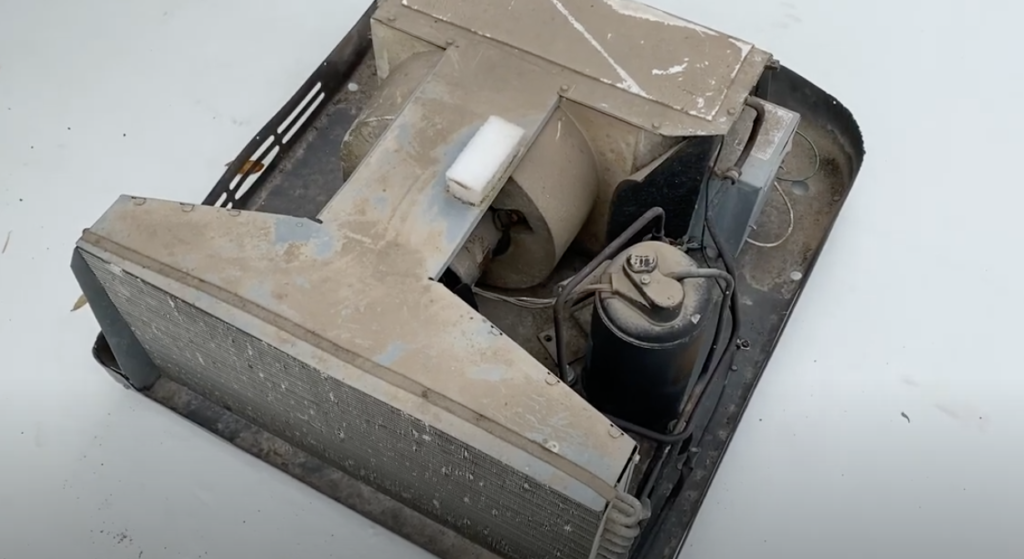
It is also critical to provide proper lubrication to your fan motor. The friction generated in the fan motor’s continuous use may create unnecessary noise in your AC.
By providing adequate lubrication, the wear and tear can also be reduced, and it will further ensure that the metal on metal friction does not cause any loud or squeaky noise.
When using a lubricant, it is essential to use good quality ones so that the metal in the fan motor does not get damaged in the process.
Clean Out Greasy Ducts
Having dirty and grimy ducts can also lead to many problems, including the generation of a lot of unwanted noise every time you turn on your AC unit.
You need to keep the ducts clean, or, in some cases where they cannot be cleaned thoroughly, replacing them with new ducts in order to reduce the noise coming out of the AC unit.
Remember to check the ducts when you are going about doing your routine maintenance work for the AC unit.
It will be an excellent time to identify any loose ends and fix them so that the overall functioning of your AC is not impacted, and any unwelcome noise is prevented.
Make Sure That the Air Vents Are Open
If, by chance, there is restricted airflow in the AC unit, then that too can cause a loud whirring noise as the AC unit is putting in double the effort to suck in the air before it processes the air further.
The AC unit must have access to enough air in the first place to circulate cooler air into the RV.
Closed air vents or air vents with a lot of dust and dirt are also one of the reasons why AC Units make a loud noise.
You will need to check the AC unit and keep the air vents clean and open to ensure that enough air is being sucked into the unit when you turn your AC on.
Check for the Cooling Capacity in Your AC Unit
Not all AC units are designed for extremely harsh climates. Some AC units may be particularly overworked if they have to function in an incredibly hot climate.
So, it is essential to check for AC’s cooling capacity before you make a purchase.
If you know you are headed to an incredibly hot and humid place, it is important to invest in an AC that can withstand the hot air there and function continuously and optimally using that hot air.
It is understandable if you want to switch off the AC completely in order to escape the noise and have some peace and quiet.
But you do not always have to trade your comfort for peace.
By looking for the possible causes for the disruption and trying to fix them, you can both have the comfort of the air conditioner and your peace of mind
Hopefully, you were able to find this article helpful in understanding some of the common issues that lead to loud noises coming from the RV’s AC and the solutions we can implement to mitigate these problems.
Cody and Jackie
One response.
This was an informative article. We are newbie RVers. We’ve done & loved primitive camping, so boondocking sounds right up our alley. Please keep the articles coming. Grace & Dick/ [email protected]
Leave a Reply Cancel reply
Your email address will not be published. Required fields are marked *
Save my name, email, and website in this browser for the next time I comment.
Table of Contents
Related posts.
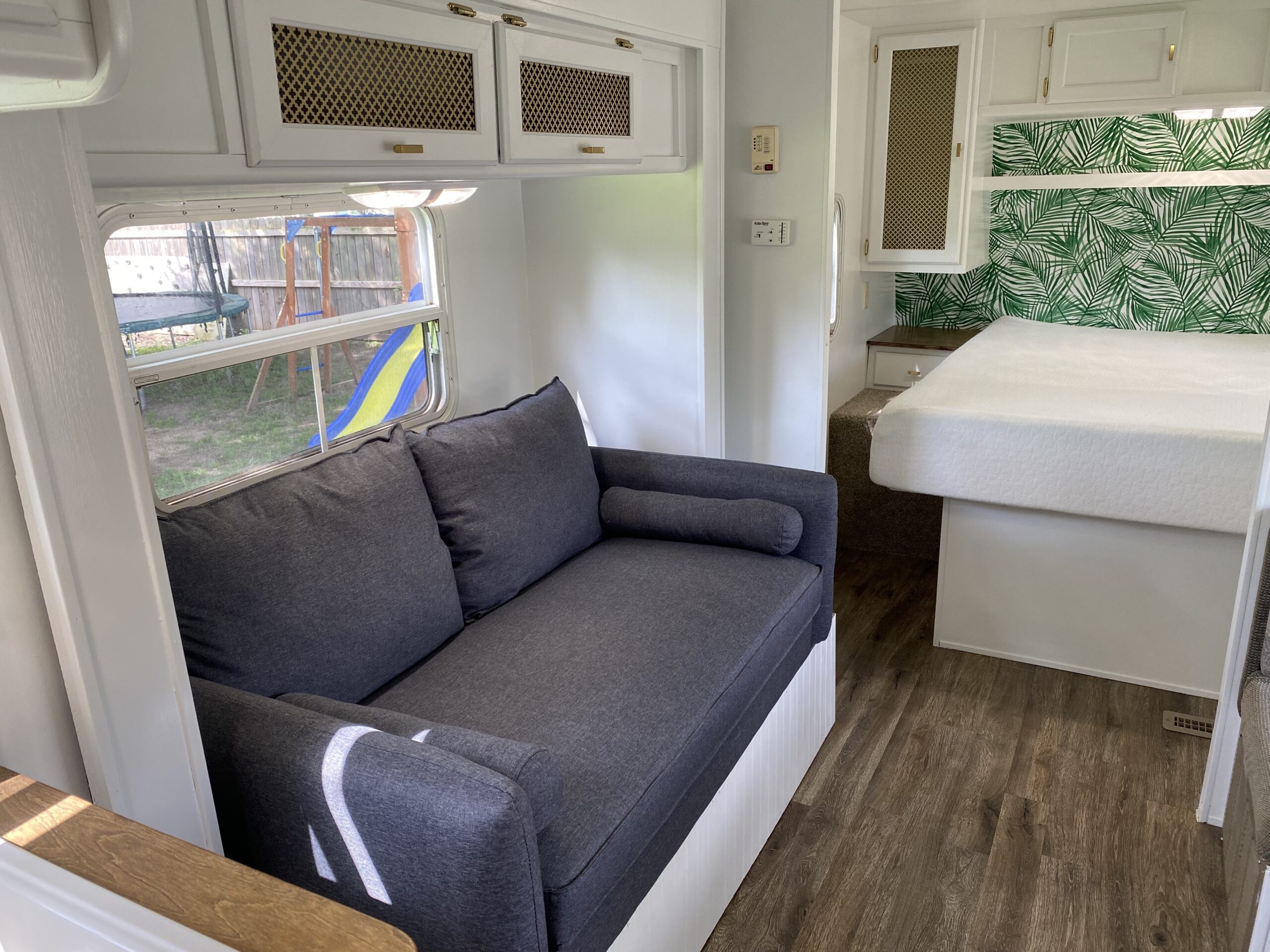
Can You Put Real Furniture in an RV? Essential Tips and Considerations
When it comes to customizing your recreational vehicle (RV), you may wonder if it’s possible to incorporate regular furniture rather than traditional RV furniture. The
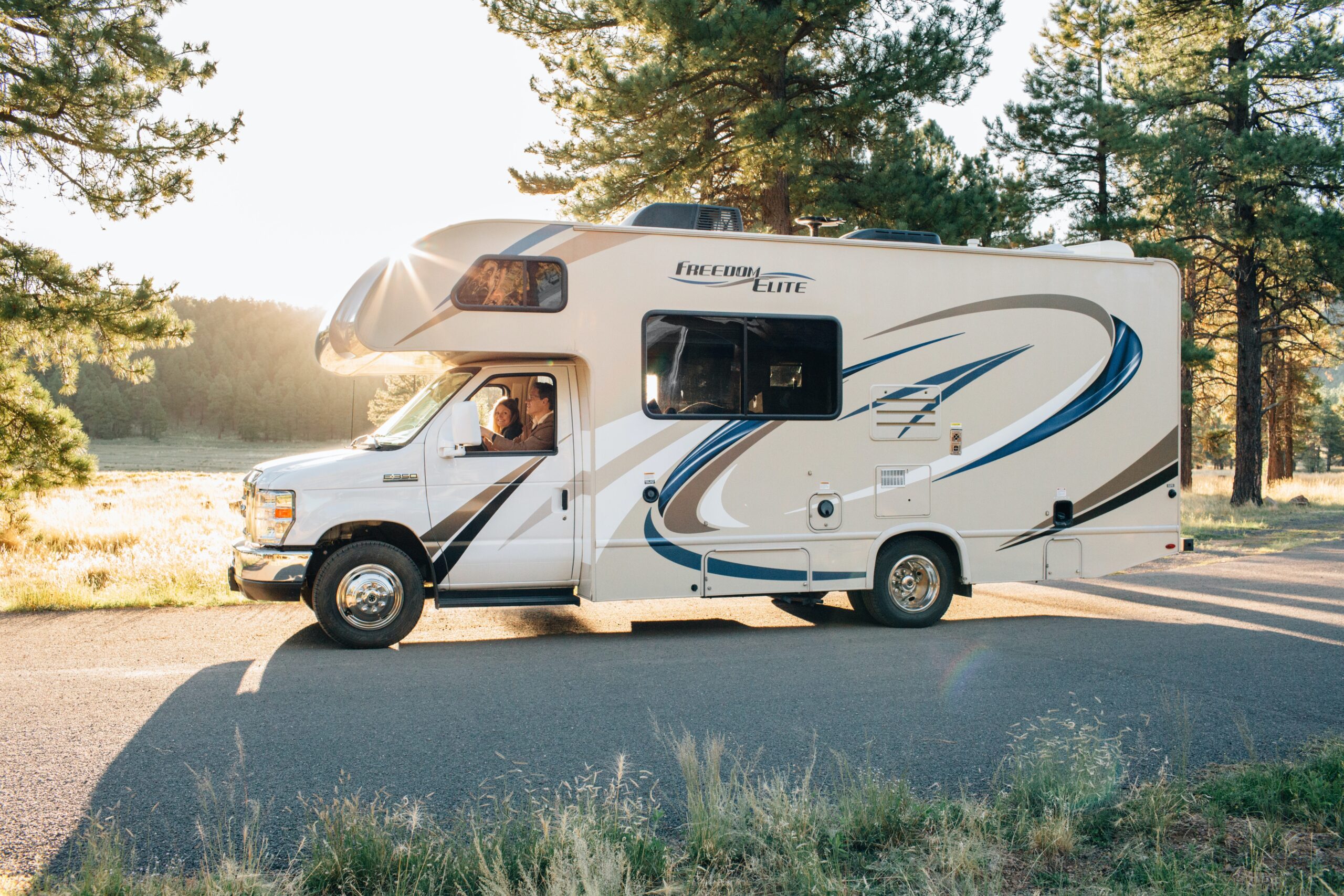
Are RVs Losing Value? Analyzing Trends and Factors
The market for recreational vehicles (RVs) has experienced significant growth in recent years. However, potential buyers often wonder whether RVs lose their value over time

What is the Average Lifespan of an RV? Top Considerations
Recreational vehicles, commonly known as RVs, have become a popular choice for those seeking endless adventure and comfort while on the road. However, a common
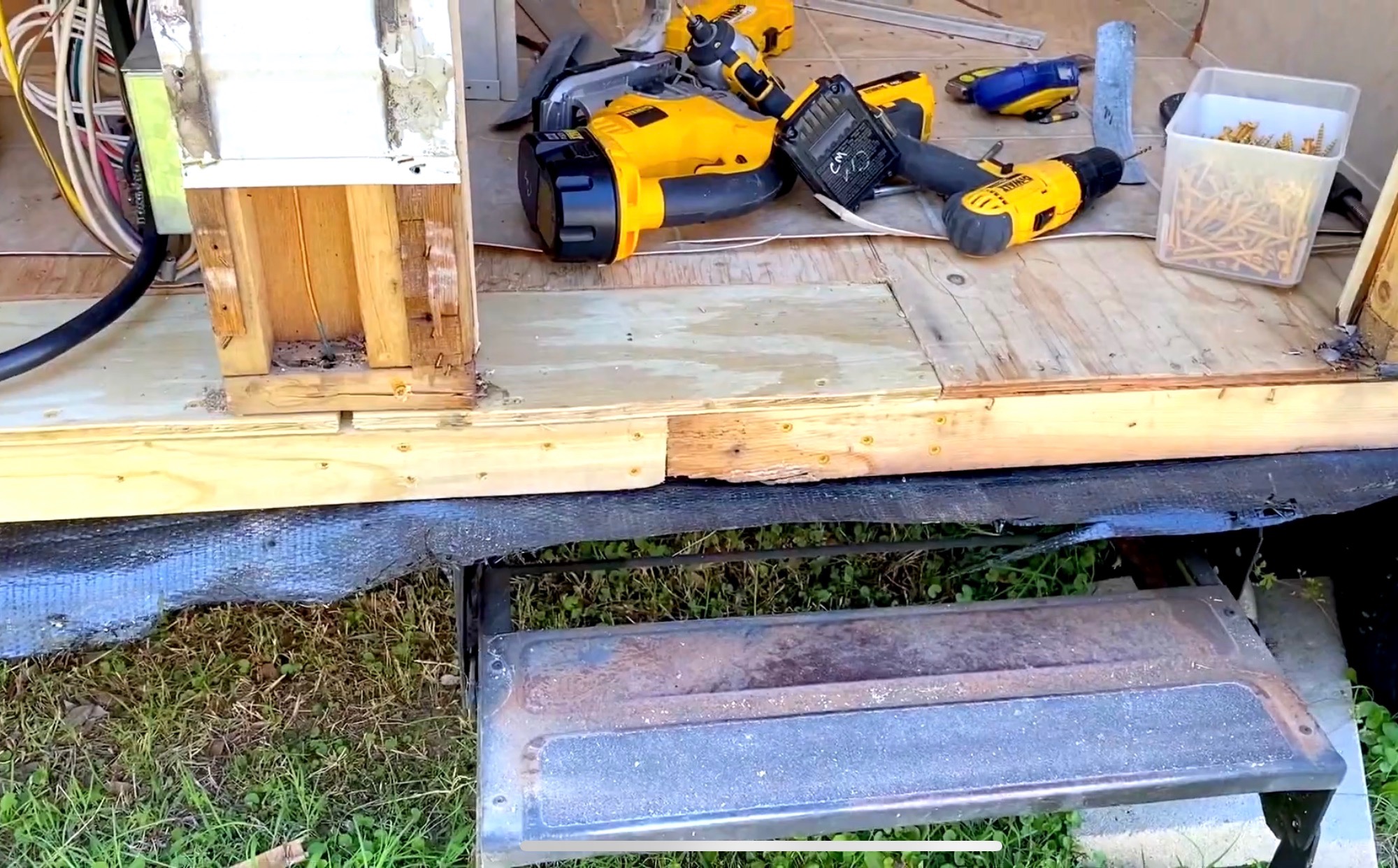
RV Remodel Supplies: Your Go-To Guide for a Stylish Makeover
Embarking on an RV remodeling journey can be both exciting and rewarding, allowing RV enthusiasts to truly personalize and optimize their living spaces on wheels.

- Recent Articles
- Share Your Remodel
Subscribe to our (not-very-often) newsletter
Follow us on youtube, all rights reserved © 2023, diy remodeling, renovating, and maintaining rvs, contact information.
Follow Us on YouTube:
Work with us.

Noise Reduction Techniques for Quieter RV Air Conditioning System
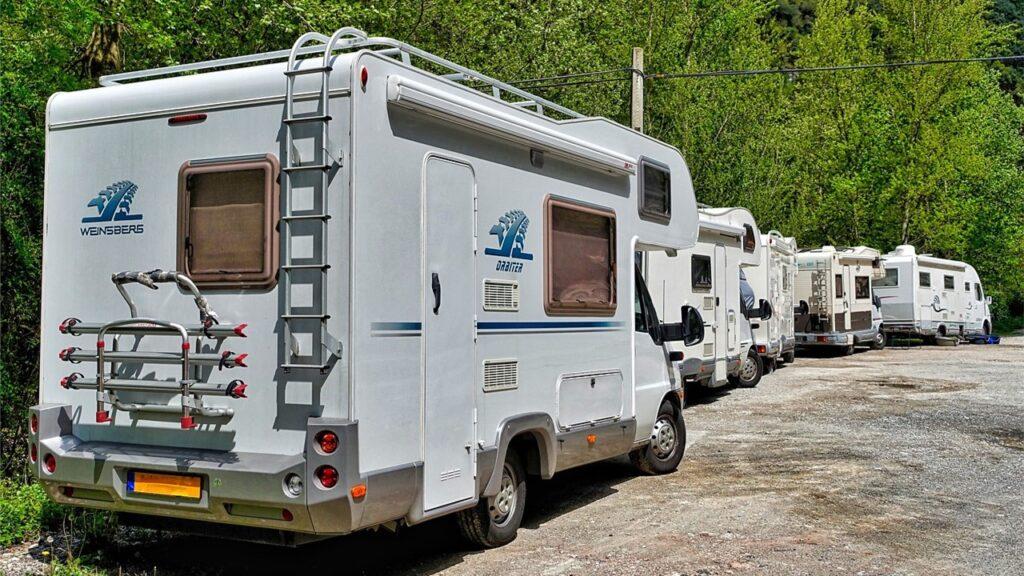
Air conditioning noise can really disrupt your RV adventures. Understanding the common sources of noise in RV air conditioning systems is essential. Typically, these noises come from mechanical vibrations, loose components, or inadequate insulation. Fans and compressors are often culprits, generating vibrations that resonate through the RV. Ductwork design can also amplify noise, creating a less-than-pleasant environment. Reducing this noise can greatly enhance your RV experience, making it more relaxing and enjoyable. A quieter RV allows you to better appreciate the serenity of nature, have conversations without shouting, and sleep soundly. By implementing effective noise reduction techniques for quieter RV air conditioning systems, you can transform your RV into a peaceful retreat.
Table of Contents
Essential Factors Contributing to RV Air Conditioning Noise
Ever wondered why your RV air conditioning system seems noisier than it should be? Let’s dive into the essential factors that crank up the volume and disturb the peace. Understanding these can help you turn down the dial on noise and turn up the comfort on your RV travels .
Mechanical Vibrations and Their Impact
The hum and rattle from your RV’s air conditioner mostly stem from mechanical vibrations. These vibrations are primarily produced by the compressor and fan units, which are the heart and lungs of your AC system. When these components are not securely mounted, they can shake, leading to an orchestra of unwanted noise. Additionally, loose components like screws or brackets can exacerbate this vibration, turning minor hums into major annoyances.
The Role of Ductwork in Noise Amplification
Moving to the veins of your AC system—the ductwork. The way ducts are designed and installed can significantly affect the sound levels in your RV. Poorly secured ducts can lead to noise amplification throughout your space. To combat this, start by identifying any loose fittings or sections where the duct might be hitting other parts of your RV. Tightening these can drastically reduce noise levels.
Insulation Deficiencies and Noise Penetration
Insulation plays a crucial role in muffling the sounds of your RV air conditioning system. Inadequate insulation not only lets the noise out but can also allow external sounds in, disturbing your peaceful retreat. Upgrading the insulation around your AC unit and in the walls can be a game-changer for maintaining tranquility.
After covering these key areas, you’ll be well on your way to reducing noise from your RV air conditioning system. So, before you hit the road for your next adventure, consider a quick inspection and update of these components to enjoy a quieter ride.
Key Techniques to Reduce Noise in RV Air Conditioning Systems
If you’re aiming for a serene journey in your RV, focusing on reducing air conditioning noise is a smart move. Here’s how you can achieve a quieter atmosphere, making your RV a perfect oasis of calm.
Choosing the Right Air Conditioning Unit for Quiet Operation
Selecting the right air conditioning unit can make a significant difference. Look for models specifically designed for low noise output. Many modern RV air conditioners are engineered to be quieter, so comparing the decibel levels between models can help you make an informed decision. This is especially important if you’re upgrading or replacing an older unit.
Enhancing Insulation Around the AC Unit
Next up, let’s talk about beefing up the insulation. This is a practical step that you can take yourself. Start by sealing gaps and adding soundproofing materials around your AC unit. Materials like foam insulation panels or sound-dampening curtains can be very effective.
Installing Vibration Isolators on AC Components
Another technique is to install vibration isolators. These handy devices can significantly reduce the amount of noise transmitted through the structure of your RV. They work by absorbing the vibrations before they can spread, thus muting the ruckus your AC might otherwise cause.
Regular Maintenance Practices for a Quieter AC
Lastly, don’t overlook regular maintenance. Ensuring your air conditioning system is well-maintained is crucial. This includes cleaning filters, checking for loose parts, and ensuring the system is correctly charged with refrigerant. These simple steps not only keep your AC running efficiently but also quieter.
By adopting these noise reduction techniques for RV quiet air conditioning systems , you’re not just enhancing your comfort but also ensuring that every journey is as enjoyable as the destination. Before you know it, you’ll be soaking up the silence and wondering why you didn’t tackle these tweaks sooner.
Step-by-Step Guide to Retrofitting Your RV Air Conditioner for Less Noise
Tired of the constant hum and rattle from your RV air conditioner? Good news: you can fix that! Here’s a detailed, easy-to-follow guide to help you retrofit your RV air conditioner and enjoy a much quieter ride.
Step 1: Assess Your Current RV Air Conditioning Setup
Start by taking a good look at your current setup. Listen closely and figure out where the noise is coming from. Is it the compressor, the fans, or maybe the ductwork? Identify any loose components and check for poorly insulated areas. This initial step helps you pinpoint the exact spots that need attention.
Step 2: Secure Loose Components
Next, grab a screwdriver and tighten any loose screws, bolts, or fasteners. Sometimes, the noise is simply because things have shaken loose over time. Securing these components can make a big difference. Use thread-locking compounds for screws that tend to loosen frequently.
Step 3: Enhance Insulation Around the AC Unit
Insulation is your best friend when it comes to reducing noise. Use soundproofing materials like foam panels or mass-loaded vinyl around your AC unit. Make sure to cover all gaps and ensure the insulation is snug. This step not only helps in reducing noise from your RV air conditioning system but also improves your unit’s efficiency.
Step 4: Install Vibration Isolators
Vibration isolators are amazing at dampening the noise from your AC unit. Install these on the compressor and fan units, and on any mounting brackets. They absorb and minimize the vibrations, significantly reducing the noise that travels through your RV’s structure.
Step 5: Regular Maintenance and Upkeep
Don’t forget regular maintenance. Clean your AC filters often to keep the air flowing smoothly and prevent the unit from overworking. Check for worn-out parts and replace them as needed. Regular upkeep keeps your AC running quietly and extends its lifespan.
Step 6: Upgrade to a Quieter Model
If your AC unit is old and noisy, consider upgrading to a newer, quieter model. Look for air conditioners designed with noise reduction in mind. Compare the decibel ratings and choose the quietest option available. This might be one of the most effective ways to ensure a peaceful RV environment.
Step 7: Fine-Tuning and Testing
After making all these modifications, it’s time to test your AC. Turn it on and listen closely. If there’s still some noise, adjust the insulation or isolators as needed. Regularly check and fine-tune to keep the noise levels down.
By following these steps, you can master noise reduction techniques for quieter RV air conditioning systems. Whether you’re parked at a campground or on the move, these adjustments will help you enjoy a quieter and more comfortable RV experience.
Wrapping It Up!
Reducing noise in your RV air conditioning system is more than just a comfort issue; it’s about enhancing your overall RV experience. A noisy AC can be incredibly disruptive, making it hard to relax, converse, or even sleep. Implementing effective noise reduction techniques for quieter RV air conditioning systems ensures that your travels are peaceful and enjoyable.
By addressing mechanical vibrations, improving insulation, securing loose components, and considering an upgrade to a quieter model, you can significantly reduce the noise levels of your RV’s AC unit. Each of these steps, though simple, can have a profound impact on the quality of your RV living experience. You’ll no longer have to compete with the constant hum of your air conditioner, allowing you to better appreciate the tranquility of nature and the joy of the open road.
Moreover, these noise reduction techniques not only improve comfort but also enhance the efficiency and longevity of your air conditioning system. Regular maintenance and thoughtful upgrades ensure that your unit operates smoothly and quietly, reducing the likelihood of costly repairs down the line.
Tackling the noise from your RV air conditioning system should be a priority for anyone looking to improve their RV lifestyle. Whether you’re parked at a scenic campground or cruising along the highway, a quieter AC makes for a more pleasant and stress-free journey. Implement these techniques and transform your RV into the peaceful haven you’ve always dreamed of.
Related FAQs
Why is my rv air conditioner so loud.
The noise often comes from mechanical vibrations, loose components, or inadequate insulation.
How can I tell if my AC ductwork is causing noise?
Check for loose fittings or sections where the duct might be hitting other parts of your RV.
What materials are optimal for soundproofing my RV AC?
Foam panels and mass-loaded vinyl are excellent for enhancing insulation and reducing noise.
How often should I maintain my RV air conditioner to keep it quiet?
Regular maintenance, including cleaning filters and checking for wear, should be done at least twice a year.
Is it worth upgrading to a newer, quieter AC model?
Yes, modern units are designed to be quieter and more efficient, making them a worthwhile investment.
As outdoor enthusiasts ourselves, we understand the significance of reliable gear that can withstand the elements and support you throughout your journey. We try to provide as much real life information with our guides and how tos to the readers as possible. Our honest and transparent reviews of essential outdoor gadgets and products are rooted in testing and experience. We take great satisfaction in offering unbiased evaluations, ensuring that you can make informed decisions when investing in outdoor gear. As an affiliate website, we may earn a small commission from some of the products we feature. However, rest assured that our opinions are not influenced by this, and your trust is always our top priority.
Related Posts

5 Best RV Kitchen Faucets for Running Water Supply In Camper Van Life In 2024
Choosing the right kitchen faucets for your RV is about enhancing the convenience and efficiency…

How to Set Up a Portable Camping Shower in Remote Locations While RVing
Embracing the great outdoors on an RV trip brings a promise of adventure, yet maintaining…
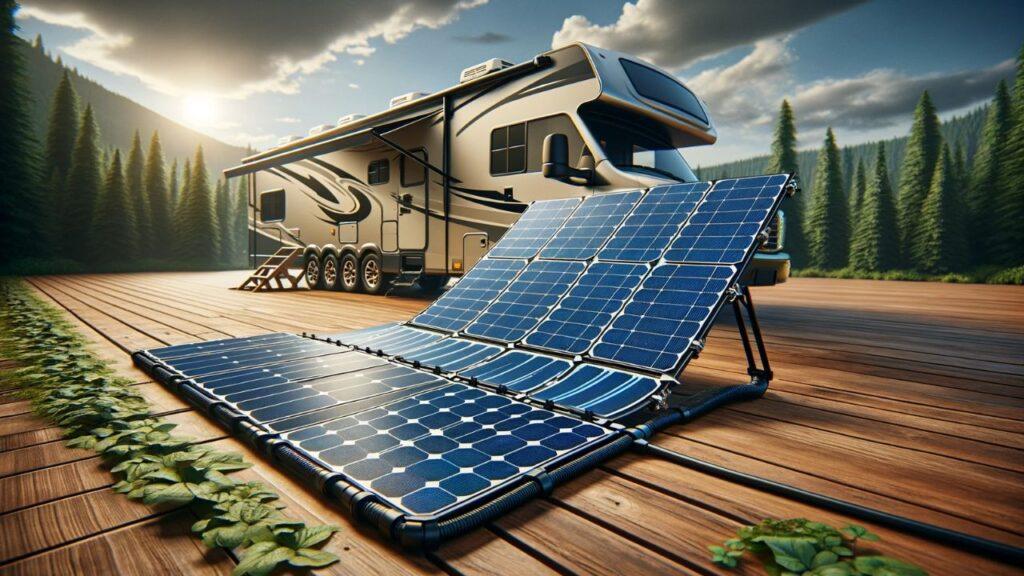
5 Best RV Flexible Solar Panels for Camper Van Life Power Electricity Generation In 2024
Preparing for an adventure in your RV brings the promise of freedom and exploration, yet…
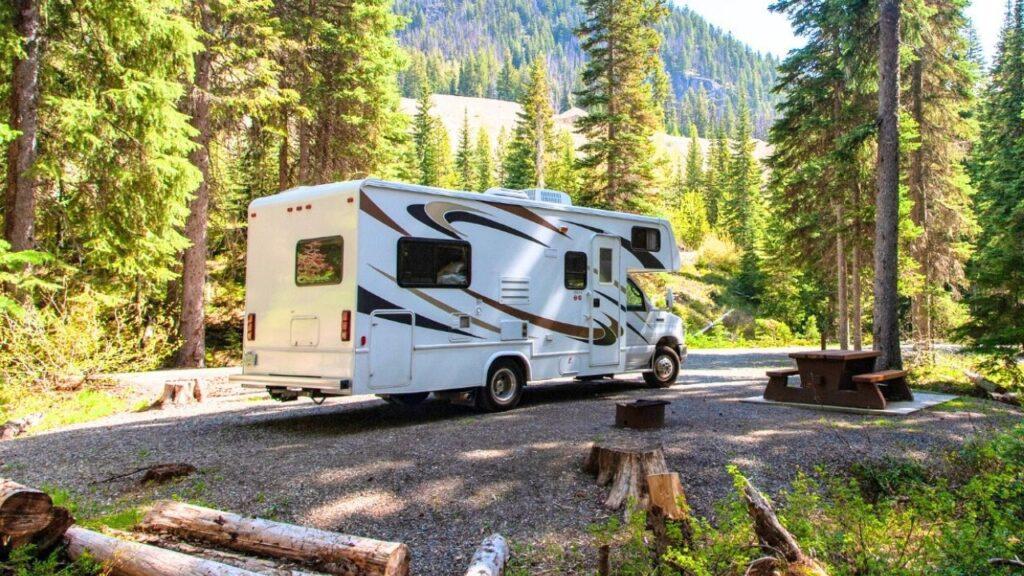
5 Best Portable Generators for Van Life In 2024
In the wilderness with a campervan, the landscape is serene, but a generator becomes an…
Leave a Comment Cancel Reply
Your email address will not be published. Required fields are marked *
Save my name, email, and website in this browser for the next time I comment.

- You are here:
- Home »
- Blog »
- RV Air Conditioner
- » How to Make Your RV Air Conditioner Quieter: 6 Helpful Tips
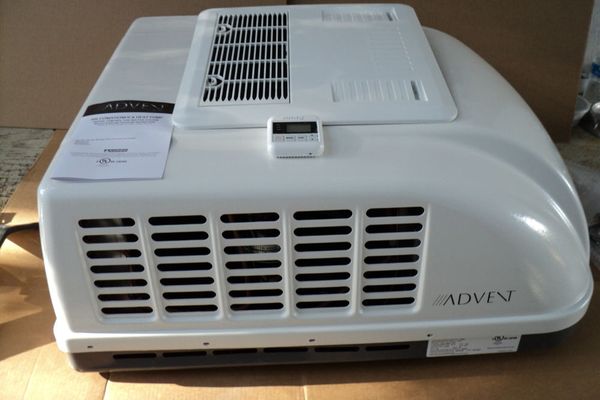
How to Make Your RV Air Conditioner Quieter: 6 Helpful Tips
- June 21, 2019 /
- RV Air Conditioner /
- By R. Geraldi /
One of the reasons you go on vacation to the great outdoors is to get away from the noise of your city. It is peaceful and calm in nature and you enjoy those moments where there is no noise bothering you. Then you turn on your Air conditioner.
How to Make Your RV Air Conditioner Quieter: It may seem that your RV’s air conditioner is powered by a jet engine but it is possible to quiet them down. Some times all it takes is to tighten a few nuts and bolts to reduce the noise.
Getting your RV’s AC unit quieter will depend on its age and who made it. Just keep reading to find some helpful tips on how to have more peace and quiet when you are in the nature.
Tip #1 : if you have an older air conditioner in your RV, there is little you can do to stop the noise. One fix is to check the bushings to make sure they are not loose
Tip #2: Your fan blades may be dirty and out of balance. A good cleaning will solve that issue in no time
RV Air Conditioner Too Noisy
There are a variety of reasons why your roof top air conditioner makes so much noise. One main reason is that it is getting too old and is almost near the end. When this happens you should consider replacing the air conditioner with an upgraded model.
Another reason is that the rubber cushions have become hard over time and do not absorb the vibration as well as it used to. Then a third reason could be that the vibration of the AC unit loosened a lot of nuts,bolts or screws. You would need to get up there and check, then tighten any loose hardware you find.
Tip #3: If your air conditioner is making too much noise, some times it is cheaper to replace it with a newer model than trying to fix it
RV AC Silencer
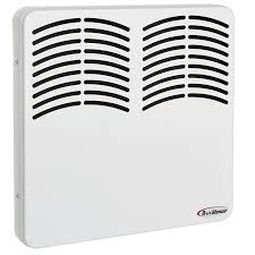
If you are not mechanically inclined there is still some good news when it comes to reducing the noise level your AC unit produces. It is called a Dometic RV AC silencer and it can be installed in about 15 minutes.
This version of an AC silencer, if installed correctly can lower your noise level between 8 to 10 decibels. The key is in all of its parts. One trick they use is to put recycled cotton lining inside the duct system to make sure the noise is stopped before it gets inside.
The filter system is not hard to keep clean either. After installation you should be able to get a little peace and quiet once again.
Tip #4: One way to quiet your RV’s air conditioner is to turn the fan speed down from high to low. Going for the simplest fixes is best and will save you time and money
Is There a Quiet RV Air Conditioner?
Yes there is a quiet RV Ac unit on the market today. But you may not find it in any of the older models. As technology continues to find new ways to design RV air conditioners, it also finds ways to make them quieter.
But, having a whisper quiet air conditioner doe snot mean that you will not hear your RV’s air conditioner. They will still make noise when you turn them on. Only the noise level will not be as loud as other models.
It is also possible to get 15,000 BTU units that make very little noise when they are running. Newer RV air conditioners are being designed and built with your comfort in mind. That means researchers are taking the time to conquer the noise issue
Tip #5 : To cut down the noise, you could try to open your air conditioner from the inside and check to see how clean the ducts are. Checking the fan wheel to see if it runs right then repair any issues to help cut the noise
Most Quiet RV Air Conditioner
You actually have a choice as to which RV AC unit is the quietest. Each one is very close in noise suppression and sound output. First, the whisper Quiet model found in Jaycee and Excel RVs produce very little sound. That is because of its dual duct system.
You can find these whisper quiet models on 5 th wheel trailers as well. They do not ride any higher than standard air conditioning units. Another good selection would be a low profile Coleman air conditioner.
These units are made to make sure that the noise does not interfere with your other activities. Its compressor cycles on and off so there may be some start up noise for a short time.
The last quiet RV air conditioner on this list is a Dometic roof top model. It also has a compressor that cycles on and off and it may be a bit noisier than the Coleman. But pound for pound, this Dometic will compete with the Coleman for being the quietest.
If one had to declare a winner then the Coleman would be the quietest of all three roof top models.
Tip #6 : Check to make sure your air vent registers are all open. Restricted air flow causes the fan to make more noise than usual.
Some Final Comments
Getting peace and quiet when you are out in peace and quiet can seem to be a difficult task. That is if you own an older RV with an air conditioner coming to the end of its life.
To solve the issue, you may have to replace the old air conditioner with a new upgraded modern version. If you do not have the budget for that, then follow the tips above and check to see if there are some other problems causing the noise.
Fix those and you can enjoy your RV’s air conditioner for a while longer. Make sure to do regular cleaning or your filters, fan and duct system. Restricted air flow can interrupt a smooth running air conditioner and produce more noise.
Related Posts
Airxcel 48000 Series Troubleshooting (RV AC Not Cooling)
RV AC Water Runoff: Why Is My RV AC Dripping Water Outside?
RV AC Hums But Won’t Turn On (Why and How To Fix It)
Leave a Comment:

- Books & Merch
- Gear We Use
- National & State Parks
- Best RV Campgrounds in New Hampshire
- Best RV Campgrounds in NC Mountains
- Best Florida Beach RV Campgrounds
- South Dakota
- The Great Lakes
- Campers Swear By This Portable Device That Keeps Dogs Safe -The Best Portable Dog Fence for Camping (2024)
- Mosquitos and bugs
- Camping Clothes
- Camping Gifts
- Camping Internet
- 5 Best RV Backup Cameras for RV & Trailer
- 7 Best Screen Tents for Camping (2024)
- Best RV Campgrounds in California
- 5 Best Key West RV Parks
- 9 Best RV Campgrounds in New Jersey
- Camping Reservations
- Campground Comparisons
- Cheap or FREE RV Camping Sites
- Best RV Campground Memberships & Clubs
- Boondocking 101
- Boondocking Adventures
- RV Internet
- What Do Flamingos and Upside Down Pineapples Mean?
- Where to Find FREE or Cheap RV Sites Camping
- RV Winter Camping
- RV Show List for 2024
- 17 Best Camper Vans 2024 (New Class B RVs Available!)
How Do I Make My RV Air Conditioner Quieter (7 Helpful Tips)
Your rv a/c adds lots of comfort to camping but quickly becomes a nuisance if it starts rattling and clanking. and it’s not a question of if but when it will start making too much noise. so, here are 7 helpful tips to make your rv air conditioner quieter….
- 1 Your RV A/C adds lots of comfort to camping but quickly becomes a nuisance if it starts rattling and clanking. And it’s not a question of if but when it will start making too much noise. So, here are 7 helpful tips to make your RV air conditioner quieter…
- 2.1 1. Clean Your AC Components Regularly
- 2.2 2. Use an RV Air Conditioner Silencer
- 2.3 3. Look for a Loose Rubber Gasket
- 2.4 4. Lubricate Sliding Parts
- 2.5 5. Tighten Bolts and Screws
- 2.6 6. Insulate Your AC Unit
- 2.7 7. Seal Gaps and Openings
- 3 What About the CLUNK When Your A/C Turns On?
- 4 New ebook from Mike and Jennifer Wendland – the Natchez Trace
We don’t know about you, but we like all the different climates when we travel. We love the sometimes chilly temperatures of the Upper Peninsula and the warm weather in Utah.
The one thing we do not like is the weather extremes. Unless, of course, we are prepared for it!
We are always prepared to keep our rig warm when visiting snowy places. And when it's sweltering outside, we want to make sure that our AC is up to par!
It is the best feeling to escape the outdoor extremes and rest up in a nice, cool air-conditioned space. But what do you do if your AC starts making a racket?
Instead of running out and replacing your AC, there are things you can do to make your RV air conditioner quieter. The following seven helpful tips can help quiet your overzealous machine!
If you buy something through our links, we may get a small commission at no extra cost to you. It helps keep our lights on so we can continue to provide helpful resources for RVers. Read our full affiliate disclosure here.
7 Tips to Make Your RV Air Conditioner Quieter
Like anything in your RV, regular maintenance and care can help it run quieter and better. It can even extend the life of your RV systems, and your AC is no different.
The following seven tips are ways to make your RV air conditioner quieter. And bonus, these things will help it run better and longer so that you do not have to replace your unit too soon.
At the end, I also include an excellent product to eliminate that annoying CLUNK every time your RV turns on. Plus, the product saves your power!

1. Clean Your AC Components Regularly
Regular RV maintenance works wonders! If you keep your RV’s AC components clean, it may keep it quieter when in use. That's because dirt and debris build up in the condenser coil area.
To clean these, first ensure that the RV’s power is off and all of the systems are cooled down. Then remove the cover of the AC unit.
Remove any leaves, dirt, or other debris you can see by hand. You can also use a shop vac to suck up dirt from the fins. Just be careful not to damage any fins while cleaning.
Keeping your A/C and vents free of spider webs is also part of Preventative Maintenance Every RVer Should Do .
2. Use an RV Air Conditioner Silencer
If you are pretty good about your RV maintenance, then an RV A/C silencer may be something you want to look into. It can decrease the noise produced by your AC by 8 to 10 decibels (dB). That is significant noise reduction!
The good news is that installing a silencer is not tricky, and you can probably install it on your own. Most people say that it only takes 15-20 minutes to put in.
We have not tried this option ourselves.
3. Look for a Loose Rubber Gasket
A straightforward fix for a noisy RV AC is tightening a loose rubber gasket. You can locate the gasket by looking between the camper’s roof and the AC unit.
The gasket is usually constructed from foam or rubber materials. It prevents water leaks from entering the RV where the AC unit is attached to the roof.
The bumping RV may cause this gasket to become loose as you travel. Or, the weight of the AC unit over time can break down the gasket.
Exposure to weather conditions and light can also break the material down.
When you turn on the AC unit, it may not have a secure fit and cause a large amount of noise. So, inspect the gasket. If it looks damaged or has come unsecured, replace it.
4. Lubricate Sliding Parts
Another easy way to help quiet your AC is by lubricating any sliding parts.
The joints wear out over time and may start to squeak during AC movement.
Check each joint and make sure that it has lubricant. If it doesn’t, add some.
Some people believe that the best lubricant to use is a silicone-based lubricant, like WD-40 Specialist spray , if you have some on hand. This is not the same as what you are probably thinking of when we say WD-40, as this one linked is a true lubricant.
Add a little to the moving parts, but avoid the condenser coil. If you get some in the coil it can attract additional dirt and debris, causing further noise.

5. Tighten Bolts and Screws
AC units have lots of nuts and bolts holding all the pieces. Over time, and while traveling on a curvy road or over bumps, they loosen. This causes banging or rattling sounds when the AC is being used.
To prevent this noise, tighten nuts and bolts according to your RV’s manual. You do not want to overtighten anything since that can damage delicate parts.
A good rule of thumb is to check your AC unit when getting your RV ready for the season as part of your maintenance routine.
6. Insulate Your AC Unit
If your other maintenance tricks are not making your RV air conditioner quieter, consider adding some insulation to the unit itself. Installing sound-deadening insulation around the AC compressor can help reduce noise.
You can usually find commercial-grade insulation or soundproofing material from the local hardware store.
Purchase enough for the size of your RV. Then attach it to the exterior wall of the RV where the AC unit is positioned. You can secure it with screws or heavy-duty mounting tape.
7. Seal Gaps and Openings
One last thing to try to reduce your RV’s AC noise level is to seal any gaps or openings. Inspect the area where your RV sits. If there are any cracks or openings, seal them. We have a list of the 7 Best RV Sealants you can refer to.
Not only can this help reduce movement and noise. It can keep out drafts, along our RV be more efficient.
What About the CLUNK When Your A/C Turns On?

If your RV makes a loud CLUNK every time it turns on, you might want to look into a SoftStartRV. It helps make your RV air conditioner quieter but, better still, it helps it run off your RV battery system and low power hookups.
I interviewed the company myself and show you how a SoftStartUp works. You can watch the full interview and watch the video .
Use this link for a discount! https://softstartup.com/rvlifestyle/

Get the Home Study Course today and worry about the road, not the repairs! Every time you move your RV it's like driving through a hurricane during an earthquake. Parts break and many items need to be maintained, this program will show you how you can save time and money by gaining the confidence to take on the majority of the issues you’ll come across. Don’t get caught with your RV in the shop! Learn how you can maintain and repair your RV at your own pace and at the most convenient time for you! This course is produced by the National RV Training Academy.
New ebook from Mike and Jennifer Wendland – the Natchez Trace

The Natchez Trace Parkway will capture your imagination, soothe your jangled travel nerves, open your mind and inspire you with the history that unfolded along its 444 miles.
Each of the 7 Days of the ebook has:
- Suggested Mileposts to explore
- Places to Eat in each area of the 7 sections
- Campground descriptions and links
- Links to all the special places and information
- Links to videos that show more in detail
- and a lot of highlighted information for each section
PLEASE NOTE: This is NOT a printed, hard copy guide.
Whether you want to follow the footsteps of explorers, discover natural beauty, or visit historic sites, the Trace has something to grab your attention and leave you eager to see what’s at the next milepost.
You can see why this is one of our favorite US routes to explore. We’ve traveled it a half dozen times!
Published on 2023-01-13
Mike Wendland is a multiple Emmy-award-winning Journalist, Podcaster, YouTuber, and Blogger, who has traveled with his wife, Jennifer, all over North America in an RV, sharing adventures and reviewing RV, Camping, Outdoor, Travel and Tech Gear for the past 12 years. They are leading industry experts in RV living and have written 18 travel books.
Leave a Reply Cancel reply
Your email address will not be published. Required fields are marked *
Related Posts

SAVOR SUMMER with 15 Easy Camping Recipes

The 5 Best RV Vacuums (Top Reviews and Community Suggestions)

5 Best Flexible Solar Panels for RV Use

RV Zone is reader-supported. When you buy through links on our site, we may earn an affiliate commission. Learn more
How to Quiet RV Air Conditioner: An Easy Step-by-Step Guide for Beginners

Writen by Tom Hank

Fact checked by Joseph Varney
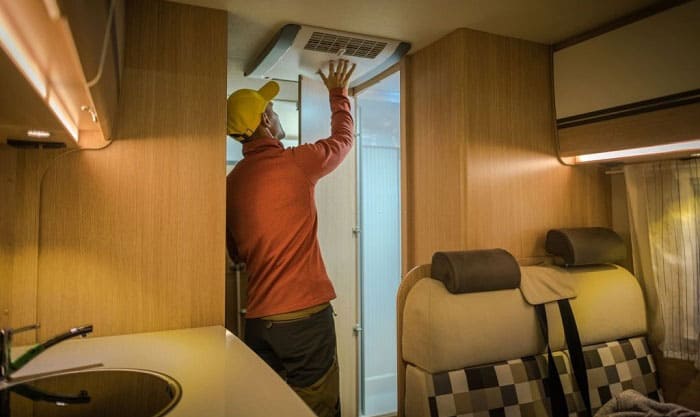
Have you wondered how to make your RV air conditioner quieter? Do you dream of a quiet RV AC instead of a noisy cooling machine? If you said ‘yes’ to either of these questions, keep reading to know how to quiet RV air conditioner.
The first step to obtaining a quiet RV AC unit is to find the source of the problem. A few reasons that can produce too much noise from a faulty or old AC include faulty fan blades and greasy ducts.
After finding the source of the problem, you should continue with the recommended steps. Continue reading to know more about how to make your RV air conditioner quieter than before.
Table of Contents
What You’ll Need
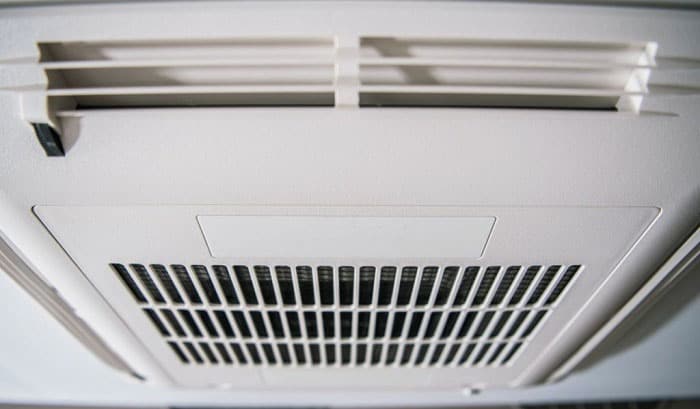
In many cases, you do not need special tools to reduce or eliminate loud noises from your RV air conditioner system . But the troubleshooting-and-repair air conditioning unit project may require certain items for proper results.
Some of the equipment you may need are:
Freon is a non-combustible refrigerant used in RV air conditioners to provide cold and comfortable air. Too little of this substance can cause unwanted air conditioner noise.
If the AC unit has a lack of Freon, it is most likely not blowing cold air. Therefore, the RV’s air conditioner exerts more effort and power to reach normal cooling temperatures.
Take note that handling Freon can be quite dangerous. You should call a certified technician to help you with this RV air conditioner noise reduction project to avoid health hazards and costly mistakes.
Current Clamp
Like many other mechanical appliances, an efficient and quiet air conditioner will pull the right amount of power from the vehicle’s battery. A low-power output can cause an annoying AC noise.
Achieving the quietest RV air conditioner means checking the cooling system to pull enough power from the mains. Use a reliable current clamp for this purpose.
This piece of equipment allows you to measure the AC’s amperage without breaking the electrical circuit. Many variants of this particular tool can even work on older air conditioners.
Remember to check the user manual to know the right places in the air conditioner to connect the current clamp.
Vacuum Cleaner
Dirty fan blades, an unclean duct system, a grimy air vent, and other filthy parts in travel trailer AC units can become the main reasons for the unpleasant noises coming from these systems.
Use a vacuum cleaner with a reasonably small attachment to suck up the dust, dirt, and filth from the whole unit. It is not advisable to use a large attachment since many RV AC units usually have fairly compact dimensions.
Take note that some air conditioners, particularly if the unit is a rooftop air conditioner, can gather more unclean substances than others. If so, you may need to use the vacuum cleaner for regular maintenance and as a deep-cleaning tool.
RV AC Noise Reduction Kit
Sometimes it can be tough to achieve satisfying results from an RV air conditioner noise reduction project. An air conditioner silencer can be appropriate for this cause.
An RV AC silencer, like the Wacko RV air conditioner silencer, helps reduce and perhaps eliminate the loud noise coming from the cooling unit.
This tool works by eliminating and preventing dust, lint, and pollen from entering the RV AC. Also, the device can help reduce noise levels from many ACs, including those from GE and other models.
Step-by-Step Instructions
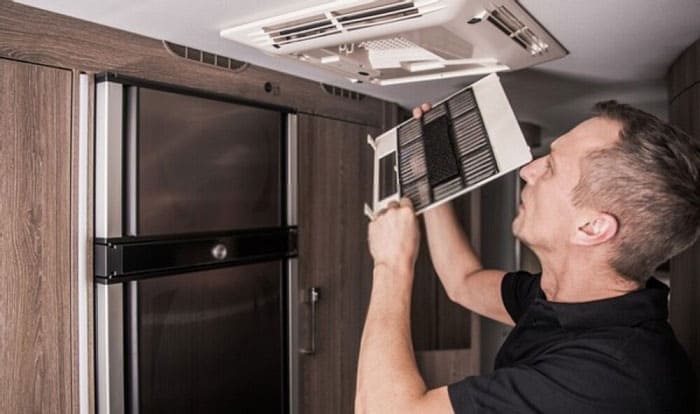
In this section, you will know about how to achieve a quiet AC unit for your recreational vehicle based on the problem’s source.
Add Freon to Reduce RV AC Noise
Remember that you should only add Freon to an RV AC if you can handle the substance.
Use an amp or current clamp to check if the AC pulls enough power from the vehicle’s main power source. If it does not, it should signify that the AC does not have enough Freon.
If you cannot find an expert nearby, here are the steps to replace the Freon yourself.
Step 1: Remove the AC’s cover. You may also need to remove the rubber gasket to gain access to the internal components.
Step 2: Use an adjustable wrench to take off the unit’s refrigerant service port cap. You can usually find this part on the suction side.
Step 3: Attach the suction side hose of the Freon’s manifold gauges to the cooling unit’s service port.
Step 4: Connect the Freon to the middle hose of the refrigerant gauges.
Step 5: Test the AC by turning it on while setting the appliance to the coldest setting. At this post, it should now be a quiet RV air conditioner. If it still produces some sound, the additional Freon should help reduce noise significantly.
Clean the AC Unit to Reduce Noise Level
An undesirable racket from an RV AC might be the cause of unclean parts, especially if it is an old air conditioner. Cleaning the unit can help and perhaps remove the annoying sounds from the system. Here are the steps to clean an air conditioner for travel trailers.
Step 1: Disconnect the AC unit from the vehicle’s power source to avoid electric shocks during the cleaning operation.
Step 2: Clean the filter using a vacuum cleaner . This appliance can help pull out loose particulates.
Step 3: Wash the filter using water and a mild detergent solution.
Step 4: Apply a mixture of equal parts vinegar and water. Spray this solution on different parts to prevent bacteria growth.
Step 5: Put the parts back in their original places.
You may also choose to do routine maintenance on the AC’s parts while cleaning the system. For instance, check if the AC mounting is secure or if you need to tighten a loose nut or other loose hardware. Also, make sure to lubricate the motor or clean the coil fins and air filters more thoroughly.
Also, ensure that you have a tightly mounted air conditioner. A rattling AC unit can also make a racket.
Install an RV Air Conditioner Silencer
Adding an AC silencer can help reduce the noise from the cooling system. But take note that the sound reduction might not be significant.
Here are the steps to help you install this kit to your RV’s air conditioner.
Step 1: Disconnect the AC from the RV’s power supply and remove the air filter.
Step 2: Remove the screws of the AC’s case and set them aside.
Step 3: Use aluminum tape to cover the rectangle air duct hole on the mounting plate, along with any other holes.
Step 4: Screw in the black base to the mounting holes lining up the air intake.
Step 5: Insert the electrostatic filter using the kit’s included screws.
Step 6: Return the AC’s base to the main unit and secure it.
So, How to quiet RV air conditioner? You need to find the source of the problem that is creating more noise inside the RV air conditioner than necessary. These issues could be anything from a lack of Freon or an unclean fan motor. Then, follow the appropriate steps to fix the noise.
Did you like this guide to proper noise reduction for RV air conditioners? Make sure to share this post with other RVers to help them in reducing noise from their vehicles’ cooling units.
What do you think about this article? Leave a comment to tell us your experiences and thoughts.

Hi, I am Joseph. Carpe diem! Seize the day! That’s always been my life motto. If you haven’t seen some of the most beautiful places in the country, you are missing out on incredible adventures.

RV Air Conditioner Making Loud Noise | What Tricks Taken by Me
RV travel provides a sense of adventure and the opportunity to explore the great outdoors, but when your RV air conditioner starts making a loud noise, it can put a damper on your journey. The tranquility of your camping experience is disrupted, and you might be wondering why this issue is occurring.
Clogged filters, loose or damaged fan blades, compressor issues, etc are commonly to blame for causing this issue. But there are more things to discuss. In this comprehensive guide, I’ll elaborate on the reasons behind a noisy RV air conditioner and provide you with valuable tips and tricks to help you enjoy a quieter and more comfortable journey.

Tips and Tricks to Make the RV Air Conditioner Quieter
So it’s clear that you’re tired of your RV air conditioner drowning out the sounds of nature with its noisy antics. Fortunately, there are several tips and tricks that can help you achieve a more peaceful camping experience. From basic maintenance to clever solutions, every effective method is mentioned below. Have a look –
- Regular Maintenance: Routine maintenance, including cleaning and inspecting key components, is crucial for keeping the AC unit in top shape and preventing unwarranted noise.
- Install a Silencer: Consider installing an RV air conditioner silencer, which can reduce noise levels significantly. These silencers use sound-absorbing materials to muffle the noise.
- Lubricate Moving Parts: Properly lubricating sliding parts, such as joints and fan motors, can reduce squeaky noises caused by friction.
- Seal Gaps and Openings: Ensure your RV’s exterior is free from gaps or openings, as sealing them not only reduces noise but also enhances energy efficiency.
- Insulate the AC Unit: Adding sound-deadening insulation around the AC compressor can help reduce noise. This material is readily available at hardware stores.
- Check Air Vents: Ensure that air vents are clean and open to allow optimal airflow, preventing the AC from working harder and generating excess noise.
- Check Ducts: Dirty or greasy ducts can contribute to increased noise. Regularly clean or replace them as needed.
- Assess Cooling Capacity: Make sure your AC unit is suitable for the climate you’ll be traveling in. Investing in a unit with the right cooling capacity can prevent overworking and excessive noise.
Why Does the RV Air Conditioner Make Loud Noise?
RVs are a fantastic way to travel and enjoy the great outdoors while having all the comforts of home. However, there’s nothing worse than trying to relax in your RV on a scorching summer day, only to be greeted by the obnoxious drone of a loud air conditioner. If your RV air conditioner is making a racket, it can quickly turn your serene getaway into a noisy nightmare. But fear not, there are several reasons why this might be happening, and there are solutions to quiet down the clamor.
- Dirty or Clogged Filters: Over time, dust and debris accumulate in the air filters of your RV’s air conditioner. This restricts airflow and forces the unit to work harder, resulting in increased noise. The simple solution is to regularly clean or replace the filters.
- Loose or Damaged Fan Blades: Loose or damaged fan blades can cause the air conditioner to vibrate, creating noise. Ensuring the fan blades are secure and in good condition can reduce this issue.
- Worn-Out Bearings: Worn-out bearings within the air conditioner can lead to a grinding noise. Replacing these bearings can restore a quieter operation.
- Refrigerant Leak: A refrigerant leak can result in a hissing noise as refrigerant escapes from the system. A qualified technician should be called in to fix the leak and recharge the system.
- Compressor Problems: Compressor issues can manifest as various noises, such as whining, rattling, or knocking. When the compressor is the culprit, it’s best to contact a technician to assess and repair or replace it.
- Old and Outdated AC Unit: Sometimes, the air conditioner itself may be old and outdated, leading to increased noise levels. In such cases, it might be more cost-effective to replace the entire unit.
- Fan Motor Issues: The fan motor is a common source of noise, especially in older units. Regular maintenance and possible replacement can mitigate this problem.
- Loose or Overtightened Components: Loose or overtightened nuts, bolts, or screws can create loud noises. Regularly check and maintain these components.
- Worn-Out Rubber Cushions: Rubber cushions inside the AC unit are meant to absorb vibrations, but over time, they can wear out or harden, causing increased noise.
- Overworked AC Unit: If your AC unit is constantly running at its maximum capacity due to extreme heat, it can lead to an overworked and noisy unit. Consult the user manual for optimal operating conditions.
- Mounting Issues: An improperly mounted AC unit can transmit vibrations through the RV walls, causing unnecessary noise. Ensure the mounting bolts are snug but not overly tight.
Is There Any Specific Considerations?
It’s important to address RV air conditioner noise promptly to avoid disrupting your peace and that of your fellow campers. Regular maintenance, inspection, and cleaning can go a long way in preventing noise issues. Additionally, when installing silencers or replacing parts, always consult your RV’s user manual or seek professional help if you’re unsure about any aspect of the process.
Final Thoughts
A noisy RV air conditioner can turn your dream getaway into a noisy ordeal, but by identifying and addressing the root causes of the noise, you can enjoy a peaceful and comfortable RV experience. Regular maintenance, checking key components, and following the tips provided can significantly reduce the noise generated by your RV’s air conditioner, allowing you to relax and enjoy your journey to the fullest. Remember, a quiet and efficient RV air conditioner is a key component of a pleasant and comfortable travel experience.
Similar Posts

No Water Coming Out of Hot Water Side in Camper (Things to Do)
While camping, I’ve encountered many challenges when it comes to keeping the comforts of home on the road. One of the most frustrating issues I’ve faced is the lack of hot water in my camper. If you’re like me and you’ve ever found yourself in a situation where there’s no hot water flowing from the…

How Long Does It Take to Charge RV Batteries? Unplugging the Myth
Ever Been There? So there I was, somewhere in the heart of Utah, surrounded by scenic wonders, living the dream, until… my RV batteries ran out of juice. Thinking I could plug them in and get them charged in a jiffy, I was in for a surprise. Charging RV batteries isn’t like charging your smartphone….

30 Amp RV Wiring Diagram | Easy Explanation and Guide
If you’re new to the RV world, or even a seasoned traveler, the spiderweb that appears to be your RV’s wiring diagram might seem a little daunting. Fear not! The 30-amp RV system is simpler than it appears, and I’m here to guide you through it. It’s a common struggle many of us face –…

Why Your RV Stove Won’t Light | 3 Ways to Fix
What happens when you are ready to embark on a picturesque road trip, the RV loaded with all your essentials, only to find that your trusty stove won’t light up? The frustration rises like the lava in an active volcano! Well, it’s a common scenario for most RVers and this can turn your camping adventure…

How To Adjust A Camper Slide Out (Easy Guideline)
Camper slider outs are one of the things sent from God himself. It’s a convenient extension of your RV or camper, that gives you more space while you are putting. Introduced back in 1990, a lot of RVs and campers offer a slide-out option. And if you have one, chances are you are going to…
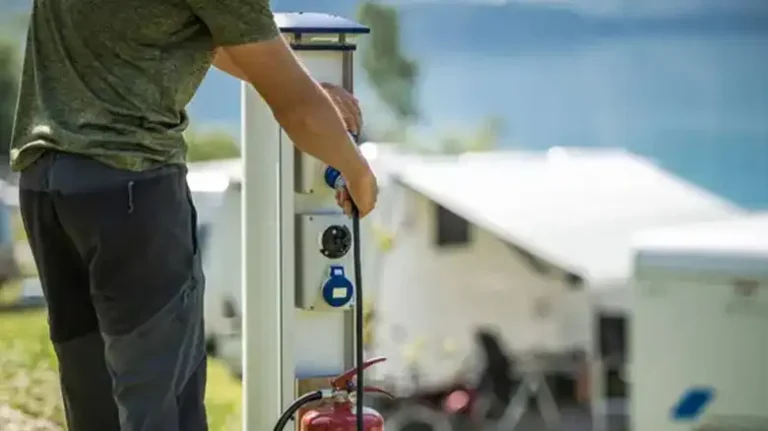
What is the Average Monthly Electric Bill for RV: A Must-Have Knowledge
The advent of RVing has revolutionized the way people explore the world, offering a unique blend of adventure and comfort. However, the inherent challenge of powering these mobile homes has led to concerns about energy consumption and environmental impact. Here, I’m about to provide a comprehensive overview of factors affecting electricity usage, average consumption figures,…
Leave a Reply Cancel reply
Your email address will not be published. Required fields are marked *
Save my name, email, and website in this browser for the next time I comment.


RV Air Conditioner
Last updated on: December 3, 2021
How to Quiet RV AC: The Most Effective Ways
by Chris Coleman
www.rvtalk.net is reader supported. When you buy through links on our site, we may earn an affiliate commission.
The air conditioning system in the RV appears to be powered by a jet engine sometimes. Such noise is annoying when you are trying to sleep at night, watch your favorite TV show, or just driver peacefully. How to quiet RV AC ? Well, you just have to tighten a few bolts sometimes to reduce the noise. But it could be something more serious.
Dealing with unpleasant noises coming from the AC can cause irritation and frustration during RV travel. Good news is you can easily find out the source of trouble and fix this.
Old air conditioner
Worn out rubber cushion, a loose component, install an rv ac silencer unit, buy a quiet rv ac unit, useful tips for rv air conditioner noise reduction, how to quiet rv ac: the reasons for rv ac making noises.
Like other HVAC systems, the air conditioner in the RV too can create all sorts of noises. The sound coming from the clicking compressors and blowing fans is normal, but you should not ignore it too if it sounds louder than usual and maintenance is due .

There are a few reasons for the air conditioner on the RV rooftop to make loud noises. How to quiet RV AC? You can quiet the machine easily if you can figure out the source of the turbulence.
When the air conditioning system gets too old to repair, it won’t stop making noises even if you repair the damaged parts. The only way to stop the commotion is to replace it with a new unit.

Every air conditioning system has rubber cushions for absorbing the vibration of various parts. When these cushions wear out or become hard over time, they cannot take in as much vibration as they were used to. For this reason, the air conditioner starts making noises.
A loose nut, bolt, or screw can displace a component and make it create an unusually loud sound. The easy way to fix that is to check the system physically and tighten the loose hardware.
To get all the details and repair methods of the air conditioning system, always refer to the user manual. Take the help of a professional mechanic if you are not highly skilled.
How to Make Your RV Air Conditioner Quieter
There are two ways you can reduce the air conditioner’s sound.
An RV AC silencer can help if the system does not have any problem but is still making a loud sound.
You will find several models from a few brands and the installation does not take more than 15 minutes. A unit can lower the AC’s sound by 8 to 10 decibels that can create a huge difference in restoring silence and serenity inside the RV.
These silencers use thick cotton lining inside the duct system to make sure that the noise is muffled right there.
There is no more choosing between watching TV or keeping the AC on. You can run both of them together and have a restful night’s sleep.
You will find best RV AC units on the market these days that make significantly less noise than the older models. They use advanced technology to keep the noise level down.
The new 15,000 BTU units make a little noise when they are on. In fact, most new AC models are quieter compared to their older counterparts.
However, a quiet AC unit does not mean that it will be completely silent. You will still hear it running, but the operational sound will be less than other models.
The AC units found in the RVs of Excel RVs and Jaycee are very quiet. These systems use a dual duct system to trap the noise inside the machine.

Following these tips will keep your RV’s AC in good condition and reduce noise (if there is any):
- When the AC starts making plenty of noise, the only solution is a thorough diagnosis and do the necessary repairs. If the commotion does not stop after performing regular maintenance , you need to replace either a component or the whole unit.
- Older air conditioners are not going to get fixed unless you replace them. One last thing that you can do is check the bushings to see if they are loose.
- Dirty or off-balance fan blades could be the culprits too. Clean them and the system will start making less sound.
- Another solution to the how to quiet RV AC is to lower the fan’s speed from high to low. This is one of the simplest fixes for AC noise reduction.
- Greasy ducts can be another reason for AC’s unusual sound. Cleaning or changing them will solve this problem.
- Sometimes, restricted airflow makes the AC’s fan create loud noises. In that case, make sure that the registers of the air vent are open.

About Chris Coleman
Chris Coleman is an interesting travel blogger and outdoor photographer with a great sense of humor. He owns an RV Accessories shop in New York City so he has the knowledge necessary to provide thorough reviews and give advice on how to choose the right products for RV travel. He puts all that RV knowledge and experience to good use in his sharing posts. Besides product buying guides/reviews, Chris also writes informative articles, how-to articles and RV camping guides in his own interesting viewpoint. Chris’s blog is one of the most reliable information sources for RV campers no matter if you're an expert or a determined beginner.
Related Articles in this Category
6 reasons why an rv air conditioner freezing up, can solar panels power an rv air conditioner, rv ac fan not working: tips for a proper diagnosis, the 12 best portable air conditioners for rvs, campers, how to clean rv air conditioner filter using a 5-step method, troubleshooting rv air conditioner leaks when it rains, the 8 best air conditioners for pop up campers, the 15 best rv air conditioner reviews for 2022, here is why rv air conditioner won’t turn on, rv air conditioner not blowing cold air: causes and repairs, troubleshooting rv air conditioner compressor not coming on, 8 thoughts on “how to quiet rv ac: the most effective ways”.
Since my RV gets very hot during the summer months, it would be nice to get an air conditioner for it that will really make things cool whenever I need to keep myself away from the heat. I think I’ll buy a Coleman Mach 15 air conditioner unit to make sure that I’ll have the option to do so. Thanks for adding that I would be able to reduce the loud sound that it makes with a silencer, so I’ll be sure to buy that as well.
Hi Chris, recently my RV AC is quite noisy. I thought I had to replace a new one. But your post has helped me a lot. I will check my air conditioner right away. Thanks very much!
Thank you for your post about RV a/c units being so loud with a list of things to check that may be a contributor to the problem. I am curious as to how old is old for an RV a/c unit? I’m not at home right now and I have no idea as to the make/model of the a/c unit. Guessing it is the original unit, my fifth wheel is a 2013 model. Thank you so much for your time!
Hi Kim, you should check on your unit to find the manufacturer’s date of your AC. Go to the outside cabinet of the air conditioning system. You’ll find a metal nameplate attached to it containing the system’s technical specs. Near the top of the nameplate you should see the manufacturer’s date as a month and year. Knowing the age of your RV AC would help you to decide is it a good time replacing it. When maintained correctly, your RV air conditioner should last for several years, and in many cases will last for a decade or more.
Recently my air conditioner is very noisy and I often wake up by its noise. I was thinking of replacing another one but it is very expensive because it is still new. After reading your instructions I think the AC’s rubber gasket is worn out, I’ll check it out. Thank you for writing this article.
I found the reason why it was noisy and fixed it, your post is very helpful for me. Luckily I haven’t given it up yet to buy a new air conditioner. Thank you.
Steps to Making Your Motorhome’s AC Quieter: One of the easiest ways is by checking all the system’s components and parts for any signs of looseness, or if the vents are filled with dust and other particles that can make your air conditioner work harder and create noise. AC units have many components that can contact one another, producing vibration and noise. You should cover the hoses and pipes to prevent them from rubbing against one another or also insert foam or rubber cushions between the RV AC unit and the RV rooftop. Another potential source of AC noise is the coils. I think you should inspect the AC coils and check their integrity. Besides that, a broken or faulty fan motor can also cause a loud noise. Finally, you might want to check other components for leaks if you want a quieter motorhome AC.
I use RV AC noise reduction kit. This tool works by eliminating and preventing dust, lint, and pollen from entering the RV AC. Also, the device can help reduce noise levels from many ACs, including those from GE and other models.
Leave a Comment Cancel reply
Save my name, email, and website in this browser for the next time I comment.
- AIR CONDITIONERS
- AIR COMPRESSOR
- VACUUM CLEANERS
- HEADPHONES & EARBUDS
How To Make Your RV Air Conditioner Quieter (RV AC Noise Reduction)
- by Dave Pearson
- May 8, 2024
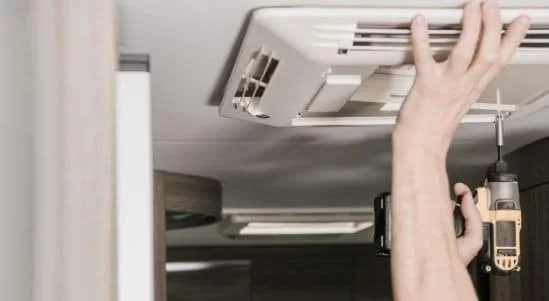
Your RV Air Conditioner is definitely your best asset when it comes to seeking solace from the harsh summer heat. Although these air conditioners provide an excellent atmosphere with cold and purified air, some of them can be really loud and noisy. So, let’s find out how to make your RV AC quieter.
RV Air Conditioner loud sound commonly occurs due to the AC’s mounting bolts and rubber cushions. This noise can easily be reduced by inspecting the mounting bolts for tightness and by checking the anti vibration pads to see if they need to be replaced. Or you can just buy a new and quiet RV aircon.
How to make your RV air conditioner quieter & reduce RV AC noise
1. inspect the mounting bolts for tightness.
One of the primary reasons for the noise might be that your air conditioner is mounted too tightly. When it is mounted too tightly , the air conditioner can transmit the vibrations in your RV quite easily through the walls and frames.
The noise gets even louder if you put the AC on full operation. To resolve this issue , inspect the mounting screws of your AC and loosen them a bit in case they are too tight.
In addition to the tightness of the screws , remember that any loose screws or bolts can also displace the component and cause loud noise.
It is recommended that you start trying with this simple solution because if this the only reason then only loosening of the bolts will get you rid of the noise. If the problem persists move on to the next solutions mentioned below.
2. Inspect the AC’s rubber cushions
You might be aware of the fact that your RV air condition comes with anti vibration pads . These rubbers cushions are meant to absorb the vibrations from components of your air conditioner when AC is operating.
When these cushions get old, they become hard and unable to perform their job in absorbing the vibrations and you will get to hear loud noises when you turn on AC.
So , if your A ir C onditioning unit has worn-out rubber cushions then replace them immediately to reduce the noise of your Air conditioner.
3. Invest in an RV AC silencer (AKA noise reduction kit)
The most effective method of reducing noise. In your RV air conditioner is installing a silencer. T his kit brings down the noise significantly .
It reduces the sound by almost 8-10 decibels. It is recommended to go for this kit only if you have completely inspected your air conditioner and couldn’t find any other visible problem and it is still making loud noises.
This kit muffles the noise with the help of thick cotton lined inside the duct system of your unit. Some noise reduction kits can also improve the airflow in addition to reducing the noise. These kits are quite easy to install and you do not need an expert for getting them installed. You can install them quite conveniently using the guide book that comes with it.
4. Replace your RV aircon with a quieter one

Your unit has probably completed its expected lifespan and the newer variants have much better noise muffling capabilities.
There are various AC’s in the market with the minimum sound at affordable pricing that can give you relief and get you rid of your noise air conditioner noise problem that had deprived you of your sleep.
Maintenance to keep your RV AC quiet
1. clean the air conditioner filters.

You must clean them regularly in order to keep your air conditioner working properly.
These filters inside your RV Roof air conditioners are present inside the RV below the air distribution bezel of the Air conditioner unit.
If the filters are pretty worn, it is recommended to replace them with new filters such as the Wadoy RV AC Foam filter which can be found by clicking here .
2. Clean the evaporator coils

These coils would be visible as soon as you remove the air filters. It is another important part of the air conditioner that requires regular cleaning.
Analyze it fully with the help of a flashlight and check if it has dust accumulated in it. Carefully remove any dust with the help of a soft bristle vacuum attachment.
The Nu-Calgon evaporator coil cleaner is the best in the market in 2024 .
3. Clear the Condenser Coils

You will need to remove the shroud on the AC, which is normally attached with the help of multiple screws.
When the shroud is removed blow out debris from condenser coils with the help of some condensed air.
Remember the right way to do this is to blow air from inside out (you need to remove shroud for this purpose).
This process must be removed every once a year for better performance of your RV air conditioner.
The Frost King Coil Cleaner is an excellent option to clean your coils .
Read also: Best Quiet RV Air Conditioner and Quietest RV Water Pump in 2024

Final thoughts on RV Reducing AC Noise
So, that’s how to make you RV air conditioner quieter. Th e noise of your RV air conditioner can easily disrupt your day to day lives, which is why it’s time to get rid of them by using the methods outlined above .
We recommend that you start with implementing simpler methods and if you are unable to reduce RVAC noise enough then it is always recommended to hire an expert to get the job done.
You can simply start with inspecting the tightness of the bolts and inspecting the rubber cushions of your air conditioner. If there is a problem in these two sections you can easily fix it by tightening the bolts and replacing the aircon anti vibration pads with better ones.
In case of an older AC that just doesn’t stop making noise no matter how many repairs you have done to it, the best thing you can do is replace it with a new, quieter model. Buy a quieter RV air conditioner and make your life easier!
Dave Pearson is a Canadian musician, sound editor, and audiophile. He is also the founder and owner of the website SoundProofGeek. On SoundProofGeek, Pearson offers advice and resources on audio equipment, including how to assess and improve audio quality, how to troubleshoot and repair audio equipment, and how to improve the music listening experience.
Table of Contents

How to Make RV AC Quieter in Simple 7 Effective Ways?
The average air conditioner is noisy. That doesn’t matter as much when it sits on a slab outside of your brick home. This creates a difficult conundrum for RV owners. The air conditioner cools things down at night, but the typical noise level may make it impossible to sleep.
An RV AC running during the day may make it hard to speak, and the noise from it on top of engine noise can be unbearable.
Fortunately, there are things you can do to quiet it down other than turn it off. Here are seven tips make RV AC quieter.
Let's Address Each of These Options in Greater Detail.
Tip 01: lower the fan speed..
A simple way to quiet the RV AC is to turn down the fan speed. The slower fan motion will reduce overall vibrations in the system. This may result in the AC not cooling things down as much as if the fan was on high, but it is better than turning the air conditioner off.
This is a temporary solution if the noise is bad but may allow you to sleep or be heard when you speak.
Tip 02: Maintain the AC.
An air conditioner is a mechanical device. Any number of issues can make it louder. Replace the air filter when it is grey so that the unit doesn’t have to work as hard and long to get air.
Clean the coils so it can exchange heat more efficiently and won’t run as long. Give the AC enough space so that it can bring in warm air and vent cold air.
Clean the fan of dirt and debris. Tighten the bolts on the housing. In older ACs, the bushings may be loose. Tightening them may solve the problem.
Turn up the AC fan and see what the new noise level is like.
Tip 03: Clean the ducts.
You may want to open the AC up and clean the ducts. This is a good idea if you’re always getting a dusty or musty smell from the AC anyway. Depending on the RV model, you may want to check the rest of the ducts and air vents, as well.
For example, don’t rip apart the AC if the noise keeping you up at night is a rattling air vent inside the AC. Open that up, clean it, put it back in place, and secure it with screws.
Just don’t glue the screws in place to limit noise, since that prevents you from being able to remove the screws to perform other maintenance later.
Tip 04: Dampen the noise.
An air conditioner that is too tightly mounted to the top of the RV roof will vibrate tightly against that surface. This generates a lot of noise. You may be able to reduce the noise level by loosening the mounting hardware, though you don’t want it to be able to vibrate loose.
Another solution is putting sound dampening pads under it. This might be foam or a blanket, though you need to take care not to let it become moldy. After all, any mold spores growing there will be sucked into your air conditioner.
Put a noise-dampening shell around the AC
In some cases, you can put a noise-dampening shell around the air conditioner. This is a variation of the noise dampening shells you see around residential air conditioners and generators.
Unfortunately, these shells add weight and drag to the average RV. On the other hand, you can check the RV AC shell for issues contributing to poor air flow. Perhaps you need to tighten a few screws or remove debris that’s flapping around in the air flow.
Cracks in the shell may need to be glued shut so that plastic doesn’t vibrate as well as increase the air noise. If you can’t find an obvious source of excess noise and you’ve maintained the RV, then you’ll need to take more drastic action.
We’ll discuss this in greater detail further in the article.
Tip 05: Repair the source of the noise.
An air conditioner is going to be noisy because of the various motors inside of it. However, the noise level will go up when these motors are wearing down. You’ll hear more vibration and friction related noise as they wear out. You may want to replace the fan motor if the fan is generating increasingly levels of noise.
The buzzing in a compressor occurs as it loses refrigerant . That needs to be repaired, and you’ll want refrigerant added to the system, as well.
Fan blades that are dirty and out of balance may be solved with a good cleaning. A bent or damaged fan blade just needs to be replaced.
Tip 06: Buy a noise reducing kit
What if there is nothing mechanically wrong with the AC? What if it is just noisy? You’re not the only one who wants to make rv ac quieter. This is why AC noise reducing kits are available on the market.
These kits often come with an air conditioner silencer. Try to buy one that fits your air conditioner and that specific make and model. It will reduce the noise without interfering in air flow or creating newly annoying vibration.
A side benefit of an AC silencer is that it is something the average do-it-yourselfer can install in fifteen minutes. They’ll lower the noise level by 8 to 10 decibels.
Do not try to make your own noise reducer. Do it yourself solutions like adding extra air filters or covering the ducts will interfere with proper air flow to the AC. You’ll wear out the moving parts faster and could cause the AC to overheat.
Tip 07: Replace the air conditioner.
This is an expensive last resort. However, it remains a potential solution. You could buy an air conditioner that is significantly quieter than the current one. And the odds are that it is much more energy efficient.
Select a properly sized unit, since an oversized unit both costs more and weighs more. However, you don’t want to buy an AC that is too small for the BTU you need, since it will run long and hard to cool down the RV. That will not only result in continual operating noises but wear it out far faster than expected.
While air conditioners are always going to generate some noise, there are steps you can take to lessen the noise level no matter what brand of AC you have. We’ve shared do it yourself tips you can follow before you start buying hardware or taking the AC in to be serviced.
Hello guys! I'm a 37-years-old author, traveler, writer, blogger, and a camper. I enjoy life as much as I can and love to visit beautiful places in my RV. That's why while traveling I have decided to dedicate some time to share my experiences with everyone that might be interested in traveling, camping, and RVs.
Leave a Reply:
Save my name, email, and website in this browser for the next time I comment.

Step-By-Step: How To Quiet A Loud RV Air Conditioner
Is your RV air conditioner too loud? It’s not uncommon for RV air conditioners to be noisy. Many RV AC units run so loudly that they can be heard outside of the RV! If this is happening in your RV, then you might want to consider a few things to quiet it down before getting it fixed.
This blog post will show you step-by-step ways to quiet that loud RV air conditioning unit. You will also learn about some of the reasons why an RV AC can be so noisy and how to fix this issue. If you are looking for ways to quiet your RV’s air conditioning unit, then keep reading!
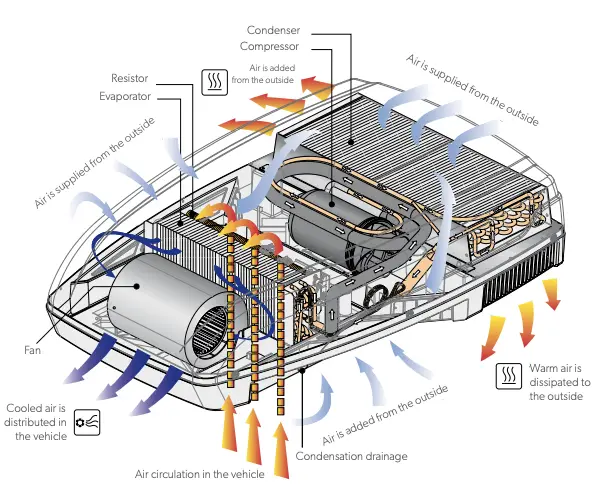
Check the Freon Levels in Your RV’s Air Conditioner
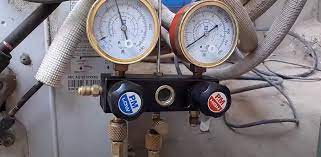
If your RV’s air conditioner has too much or too little freon, it can cause an unsettling, loud noise. This means it is time to call in a professional, as freon can be dangerous to work with. Keep yourself and your family safe by not trying to tackle this issue yourself.
RV air conditioning is a closed system. You can’t measure the freon level directly. In order to check the freon , you have to check things that indicate low freon.
The Air Conditioning Unit Isn’t Pulling the Right Amperage
To figure this out, you need to measure the amps being used for the compressor. If you are going to check this yourself, you’ll need an amp clamp , and you’ll need to know how many amps your AC unit should be pulling. If you don’t know, call the manufacturer and have your model number ready.
- Turn on the AC. Let it run for about 15 minutes before you test.
- Find the air compressor wire. It’s usually blue or purple. Check your manual if you don’t know.
- Set the amp clamp for the 40-amp scale . Let the compressor run a few minutes and then check the reading. It should be very close to the amps your unit is supposed to pull.
If the reading is low, this is your first clue that freon may be low.
Air Temperature Doesn’t Match at Intake and Exhaust
The next clue that your unit may be lacking freon is even easier to measure, as long as you have analog thermometers. The one you use for food or meat will do. You’ll need two of them.
- Put one at the intake and one at the exhaust . Let them sit there for about 10 minutes.
- The numbers should not be the same . If they are, that means the air going in isn’t getting cooled down at all because it’s coming out at or near the temperature where it started.
If the readouts are the same, or very close to being the same, you can assume your RV’s air conditioner has lost its freon. At this point, you need to call a technician unless you know how to recharge the freon yourself.
If the amps readout is correct for your make and model of the air conditioner and your temperature readouts are different, it is most likely not a freon problem.
Check for Loose Parts on the Air Conditioner Unit
Inspect the air conditioning unit for loose parts. Loose components can rattle in the machine and cause loud noises. If there are loose parts, it may be as simple as reattaching them properly.
The following are the different components to inspect on your RV’s air conditioner:
- Loose bolts – RV air conditioners are usually bolted to the metal framework that holds them, but sometimes these bolts can loosen over time after being subjected to so much vibration.
- Loose hoses or belts – Hoses or belts can make noise which only get worse as they wear out and come off their pulleys
- A vibrating cover – If the rubber gasket on the clamp holding the freon line is worn, the vibration it makes against the cover can make a loud buzz or hum. Replacing the rubber on the hose clamp might be a DIY job if you know your way around an air conditioner.
If you find that any of these issues are causing excessive noise, they are all fairly easy to get fixed.
Note: If you are going to perform the inspection yourself, use caution. Since many RV air conditioners are mounted on top of the vehicle, any work you do yourself should be done carefully and with someone else around.
Clean Out Your RV Air Conditioner’s Vents
With all that time out on the open road, moving from place to place, the air ducts inside your RV are more likely to be filled with dust and debris than the ones in your house. This makes it harder for air to move, thus defeating a purpose of an AC system and making it louder as well.
A dirty filter, like unclean ducts, will cause the air to move more slowly, and this will also make it louder. Cleaning your air filters can help to make a loud RV AC quieter too, but this will depend on how dirty they are. It is fairly simple to do, but you can also hire a service to do this.
How often you do this depends on how often you use your RV. You should be doing this every year, no matter what. But if you are traveling through dusty landscapes or moving around a lot, you may want to take care of this twice a year.

Add Insulation to Cut Down Noise from Vibration
The mat provides strong sound insulation and absorption performance, as well as heat insulation.
🌞 It helps block sunlight, engine and exhaust pipe heat from entering the car, reducing air conditioning energy consumption and saving fuel.
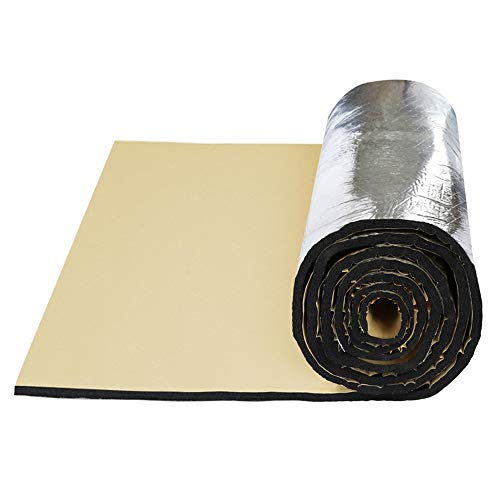
If there is a vibration that comes from anything touching any loose components like hoses or belts or just a noisy housing, then this may be causing a noise issue.
- Cover up all pipes and hoses so they do not rub against each other.
- Insulate the RV’s metal exterior where possible, such as around windows, can also reduce sound.
- Add soundproofing foam around pipes and hoses
- Cover up all wires that are near each other, so they do not rub against one another and create noise.
If you’re constantly hearing the loud, whirring fan of your RV, you may need to get some insulation installed. This will help reduce the noise that your RV makes from outside noises as well.
Inspect Your Air Conditioner’s Coils
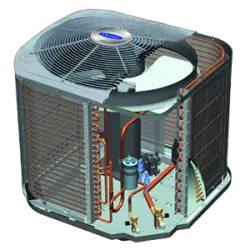
If the coils, for whatever reason, are broken or damaged in any way, then you will have a loud noise coming from it as well.
A simple solution may be to clean the condenser coil. Check for debris and clear it away if there is any. Keep the area around the condenser clean to avoid more loud noises in the future.
Make this part of your annual air conditioner cleaning and inspect everything at once, taking note of anything that needs repair or maintenance.
Look Over the Fan Motor
You may need to invest in a new fan motor, a faulty or broken motor can cause your RV air conditioner to run noisier than normal.
If your fan motor is making a buzzing or rattling sound and:
- You haven’t found any evidence of something loose or broken inside
- You know your unit is clean
- The blades seem to be running smoothly
Then it’s very likely that the fan motor itself may be to blame for the noise.
If the fan is loud and not working properly, then it should be replaced. A noisy AC unit might be making those noises because it is getting old, and in these cases, you may want to replace it altogether!
Check for Leaks, Inside and Outside
The last thing you can do is to check the air conditioner’s ducts, intake, and exhaust for leaks. A leak could be responsible for a noisy RV AC.
The following are some things you can do to fix a leaky air conditioner.
- Replace rubber cushioning – The rubber cushioning under the RV air conditioner should also be replaced to make it quieter.
- Check the drip tray – It may simply be that the drip tray is not draining correctly. By removing the shroud and some of the AC housing, you can access the drip tray and clean it out.
- Check the drain pipe for a clog – If the drain pipe is clogged with dust, debris, and dirt, the evaporated water can’t get out toward the roof and will leak back out into the drain pan/drip tray.
These are just a few of the many reasons why your RV might be loud when the AC is on, but luckily there are some easy fixes you can try first before calling in an expert! If the noise is still bothering you after you tried some of the fixes above, you may want to invest in a silencer.
We still have a few more ways for you to reduce the noise level from your air conditioner so you can enjoy van life more!
Reducing Noise Due to the Cover or Shroud
Tired of that flapping sound of the AV cover when you’re driving around? Like anything on top of your RV, that cover can make some noise if it’s not tightened down. You should cover your AC when not in use, so make sure you have a cover that fits like a glove. Covers are made from weatherproof fabric, hard plastic, or soft vinyl.
Dometic 3309518.003 Brisk Replacement is designed to replace the upper unit shroud on Brisk models. The shroud is polar white with a gray band.
It helps provide comfort and convenience and is made from quality materials.

If you have any small cracks in the outer case of your air conditioner or the outer shell seems to wobble, you don’t have to replace the unit – you can replace the shroud. You may find the replacement for your exact model from an online retailer , or you can just contact the manufacturer directly to ensure a perfect fit.
Use an RV air conditioner silencer
An RV air conditioner silencer is a device designed to reduce the noise level of an RV air conditioner. It is typically made of foam or other sound-absorbing materials and is installed inside the air conditioning unit.
To use a silencer, you will need to remove the air filter from your RV air conditioner and attach the silencer to the intake side of the unit. The silencer will help to reduce the noise level of the air conditioner by absorbing sound waves and preventing them from traveling outside the unit.
WackO Products air conditioner silencer kits allow you to run your A/C unit without all the noise, providing a quieter environment.
⏰ Installation is quick and easy, taking less than 15 minutes with a screwdriver, and no drilling is required.
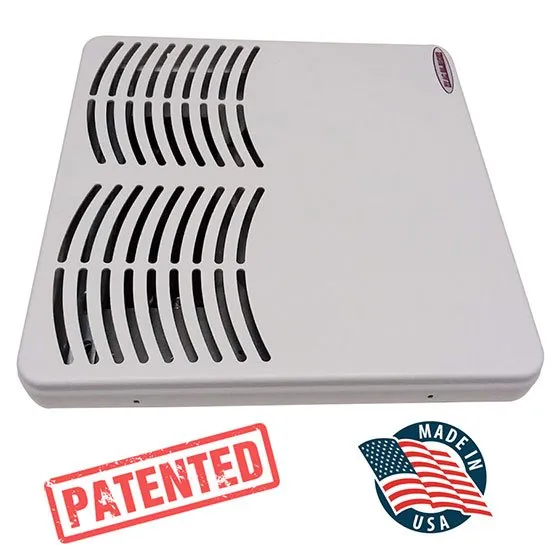
It’s important to note that not all RV air conditioners are compatible with silencers, so you will need to check with the manufacturer or a qualified technician before attempting to install one.
Overall, using an RV air conditioner silencer can be an effective way to reduce the noise level of your air conditioner and make your RV more comfortable and peaceful.
For exemple, Aron managed to reduce it’s RV AC noise from 71db to 60db with this RV AC silencer.
Easy Troubleshooting Tips for Keeping an RV Air Conditioner Quiet
Because RV air conditioners aren’t typically tranquil, to begin with, you want to keep your unit in good shape to keep it running as smoothly (and quietly) as possible.
The following is a list of possible regular fixes to keep any noise problems at bay:
- Check to make sure RV air vents are closed – If the air vents are not closed properly, you may hear residual rattling. Close them when the AC is running to reduce this added noise.
- Keep the unit free of dust and debris – If your unit is dusty, it will need to compensate by working harder over time; this can cause your unit to become louder than usual.
- Make sure door or window screens aren’t blocking airflow – remove anything that could be blocking airflow and causing any disruptions.
- Insulate, insulate, insulate – You may want to increase the amount of insulation in and around the unit to capture some of the vibrations and dampen the sound.
- Install an interior fan vent cover – This cover, in conjunction with foam padding on top of that installation, can drastically reduce fan noise.
If you are experiencing problems with your RV air conditioner that cannot be resolved by these methods, then it is recommended to have a service technician come out and diagnose if there is an issue with the actual AC unit itself.
Why Are RV Air Conditioners So Loud?
RVs have been made bigger over time, which means they need more powerful air conditioners to keep up with their demands which is why there’s such a big difference in sound level between older models and new ones.
RV air conditioners are inherently louder than a home cooling system for a few reasons:
- Vibration – Like any appliance in your RV, the vibration of being on the road makes more noise. Just as stove burners rattle in an RV and not at home, air conditioners get additional noisiness just with the vibrations of being in motion.
- Space – Everything in an RV sounds a little bit louder because you are in a relatively small space.
- Size – As mentioned above, larger RVs require larger air conditioning units. Larger units require larger compressors and larger compressors get louder.
Just How Loud Are RV Air Conditioners?
An average RV air conditioner runs at about 55 to 75 decibels – a scale on par with a microwave at the low end or a kitchen exhaust fan on high at the high end. If it sounds as loud as a window air conditioner (80-89 dB), that is getting to a range that is harmful to hearing.
When to Call a Professional About an RV Air Conditioner?
If your AC noise is getting to the point that you know something is wrong and you can’t identify the issue or troubleshot the ideas we covered, it may be time to call a professional.
The following is a list of times when you should contact an HVAC professional to inspect, diagnose and repair your RV air conditioner:
- Can’t identify the problem – If you can’t identify the issue that is causing the noise or have troubleshot the ideas we covered in this post. And there’s no obvious reason for the noise coming from your AC unit in the first place, call a professional to diagnose the issue.
- Electrical work needed – If you can identify an issue with the electrical wiring and do not have experience in electrical work, it may be best to call a professional.
- Not just loud, but also smelly – It may be time to call a professional if your RV air conditioner starts making unusual noises and emitting an unpleasant smell when it turns on. This could mean there’s something wrong with your AC unit itself.
And, lastly, if you’re not handy don’t have time to learn, there are professionals who do this for a living!
Finding A Quiet RV AC If You Need A Replacement
If you end up needing to replace your RV’s air conditioner, there are a few ways you can go about searching for a quieter option.
You can find a quiet RV AC option by doing the following things:
- Ask around . Whether it’s fellow RV owners or people who work at campgrounds near where you live, many of these people can offer their tried-and-true recommendations.
- Read the reviews before making a purchase . If you’re looking at reviews, keep in mind that the noise level for an air conditioner will depend on the location of your RV and how it’s oriented to take advantage of prevailing winds – not every product is going to be ideal for all RVs.
- Search online . A lot of air conditioning manufacturers will have a section on their websites dedicated to customer reviews, or you can do an internet search with the terms “quiet RV ac” if you want something specific according to your type of RV (i.e., fifth wheel, travel trailer).
- Visit local dealerships in person as well . Many times they will provide quotes over the phone before coming into the store, which is helpful when trying out lots of different models at once! And remember that most retailers offer warranties that last up to five years on new products; this applies even if it’s not purchased through them.
- Walk around a campsite on a hot day . Take a stroll and note which RVs have roaring beasts on the roof and which ones seem to give off more of a gentle purr. It’s worth a knock on a few doors to find out what type of AC unit they’re running.
There are always plenty of options when shopping for a new RV air conditioner; hopefully, this article gives you everything you need to know about finding one that meets your needs.
In Summary: Seven Steps to Quiet Your RV’s AC
You’ve now learned how to fix your RV AC noise problem. Now you can enjoy the peace of a cool, silent home on wheels! With the seven steps, we covered it should be easy to quickly check off which problems could be the culprit and get to solving the issues causing the noise.
Many times, you can simply fix your RV AC’s loud noise problem by installing insulation, replacing a faulty motor, or buying an RV air conditioner cover.
Classic Hymer Manuals and Brochures
Are These the Best Campervan Shower Toilet Combo Units Around?
Leave a Comment Cancel reply
You must be logged in to post a comment.
© 2024 Hi-van.com
How To Quiet RV AC: Top 7 Effective DIY Hacks
Is your RV AC making a lot of noise? Are you looking for ways on How To Quiet RV AC?
The good news is that you don’t have to live with it; some simple steps can be done to make sure the air conditioning in your RV does not create a ton of noise.
This blog post will explore ways on How To Quiet RV AC and keep your outdoor living space as quiet as possible.
Why Is My RV Air Conditioner Loud?
RV air conditioners are designed to be quiet. However, even the quietest model can still run loud on occasion.
Before assuming your unit is defective or has a serious problem, you might just need some troubleshooting guidance.
If you’ve tried all the tips outlined below and your RV air conditioner is still loud, have a professional check it out for you.
Of course, this step isn’t necessary if the unit is new (under warranty) or under extended warranty service contracts.
Also Read: How to Quiet a Noisy Window Air Conditioner
1. Dirty AC Components
It cooled as air passes through your RV’s air conditioner and the evaporator coil heat exchanger.
A fan sends this cool air throughout the interior of your RV. If you notice that your air conditioner runs more loudly than usual, one or both of these parts may be dirty.
Use a soft brush to clean off the coils and any dirt or debris inside the ducts before returning to normal operation.
You can also adjust the vents’ position to direct airflow around obstacles within the compartment, such as furniture.
Always follow the manufacturer’s instructions when performing repairs on your own unit.
Almost all units come with at least one fan (or blower) to move air from the condenser unit (outside), through the airlines, and into the evaporator unit inside your RV.
These two components are typically covered by metal or plastic grills. In some cases, when you’re standing outside near these vents, you may find that they’re extremely loud.
If you hear this noise funneling out in waves directly from the top of the unit, then it’s likely normal operation, especially if temperatures are climbing outside.
To quiet things down, cover both openings with acoustic foam or place a blanket over the grill to block some of the noise.
Working Conditions
The air conditioner is louder than usual inside your RV.
This can sometimes happen when the unit has been running for quite some time or if you’ve noticed an increase in temperature in these hot months.
Your RV air conditioner might be fighting with higher temperatures outside (this won’t always be obvious).
Also, it’s important to remember that sound travels through walls and ceilings better than it does across open space, so you may not always hear where your unit is located within your RV interior.
Again, placing acoustic foam on both sides of exposed grills will help reduce this type of loudness.
Keep in mind that rattling noises from this component are usually a sign of deeper problems that need to be addressed by professionals.
What Else Makes My RV Air Conditioner Loud?
The design of your AC: Some RVs are better insulated than others, so you’ll hear more noises from neighbors’ units.
Temperature swings : the higher the temperature outside, the louder your unit may run. Again, this is a normal operation and not a problem;
The location of your unit : units in covered RV porches or windowed bays will be louder when they’re running than those mounted on the roof.
Even placement in an adjacent room can make a noticeable difference in sound.
The age of the components (air conditioner and fan): some air conditioning parts wear out more quickly than others, so it’s always possible that something has reached end-of-life.
If you’ve recently had new ductwork installed, this could also increase noise levels because you have less insulation between the unit and its surrounding space; and
Moving air : for example, the sound of moving air will be louder inside your RV than in the surrounding space due to things like insulation, metal, and wood construction.
What Else Should I Know About My RV Air Conditioner’s Noise Levels?
At this point, you’ll need to check out a few things…before calling a service professional anyway:
Total running time since last maintenance. This can directly affect how often your unit needs repairs.
Are fresh filters being used?
After some time, filters clog up with dust and dirt from the outside of the HVAC system itself.
If you do not change your filters regularly, then performance will suffer.
Also, it could cause any outside parts of the system (like evaporator coils) to overheat and thus burn up, which is a big repair bill.
Are parts within the air conditioning system worn out?
If you are not sure about this, then have a professional come over for an evaluation;
A major or recent change in your home’s structure: You’d be surprised how much this can affect noise levels because most RVs are made of metal (this is also true with windows that leak); and
The state of your roof and walls: This will obviously play a huge role in overall noise transmission. Have these recently been repaired?
Also Read: Quietest Air Conditioner
Any gaps? Leaks? Water damage? These things all make it easier for sound to travel through structures. It’s better to fix them now before things get even worse.
Also, areas around the window screens and doors may be a problem.
Make sure they’re not damaged or flimsy because this can create noisy air leaks.
Top Ways On How To Quiet RV AC
1st fix: install a sound deadening blanket..
There are several products for this, but the most popular by far is Dynamat.
I first read about it in an article in Overland Journal that referred to reducing cabin noise in four-wheel drive (4×4) pickup trucks.
But after using it and learning how well it works, I’ve since found many other uses for it as well.
For example, try wrapping the hard plastic fender flares on your motorhome with Dynamat, and you’ll find those annoying rattles go away.
Or wrap some Dynamat around the metal frame newly installed solar panels if they rattle/clang when driving down the road at highway speeds (the solar panels are mounted on top of a rack that bolts onto the roof).
Or better yet, line the entire roof with it (either side) if wind noise is driving you nuts.
I’ve found Dynamat also makes great door/window insulation for hot or cold days – particularly the stuff called ‘Dynamat Extreme.’
2nd Fix: Install A Higher Quality Air Conditioner.
One of our early RVs had a small two-person air conditioner in it. But being two people, we rarely turned the thing on because it was just too darn loud.
So over time, we began looking for an aftermarket replacement but never found one that wasn’t noisy either.
That was until recently when we discovered Trane makes a higher quality compressor for air conditioners.
We found it at our local RV Parts & Supply store. The Trane XE130 compressor is about twice the price of other brands, but it uses very little power and is nearly silent.
So, if you are dissatisfied with your current unit, order one of these compressors and see how much better your life becomes.
The only hitch we ran into was that when we installed the new compressor, the circuit breaker kept tripping when running both the air conditioner and microwave at the same time – something we do quite often.
But when I replaced the more powerful (30 amp) RV 30-amp circuit breaker with a newer (40 amp), all was well again.
So, if you’re breaking many circuit breakers, you may need a more powerful one.
3rd Fix: Look into Getting An Inverter And Battery Charger – With Noise Filters.
This is a new solution that we just learned about last year when having our batteries replaced.
The tech told us that if we added an inverter and switched to using solar panels for shore (charging) power instead of the problematic 2-cycle generator, he could add noise filters to the inverter/charger combo so it would run much quieter than our previous unit was running on generator power only (that humming sound in the background).
So far, we are very happy with these units as they seem to be very quiet.
Our plan is to replace them when they die in a couple years (the old ones are only about 7 years old).
We have them hooked up to our solar panel’s first thing in the morning when we begin driving, then disconnect them between 10:00 AM and 4:00 PM each day.
Using this setup, we find there are still plenty of charges left stored for nighttime use during boondocking.
That’s not to say you couldn’t plugin your house battery bank at night, too – the choice is yours.
There may also be other inverter/charger combos on the market that offer similar features if you’re not happy with these.

Hi, my name is Todd R. Bressler and I am the founder of this soundproofing blog. I’m a DIY enthusiast from Cincinnati, the city that just beat New York for the City That Never Sleeps Award in 2020. ( Original ) I have been in the DIY soundproofing industry for close to 5 years, running a YouTube channel and a Podcast show every Saturday. I started Crafty Soundproofing to help you learn the basics of “ self defending yourself against noise”
Have an idea worth sharing? Please contact me and I’ll be happy to respond ASAP.
Leave a Comment Cancel reply
Save my name, email, and website in this browser for the next time I comment.
This site uses Akismet to reduce spam. Learn how your comment data is processed .

7 Most common RV Air conditioner problems and how to fix them
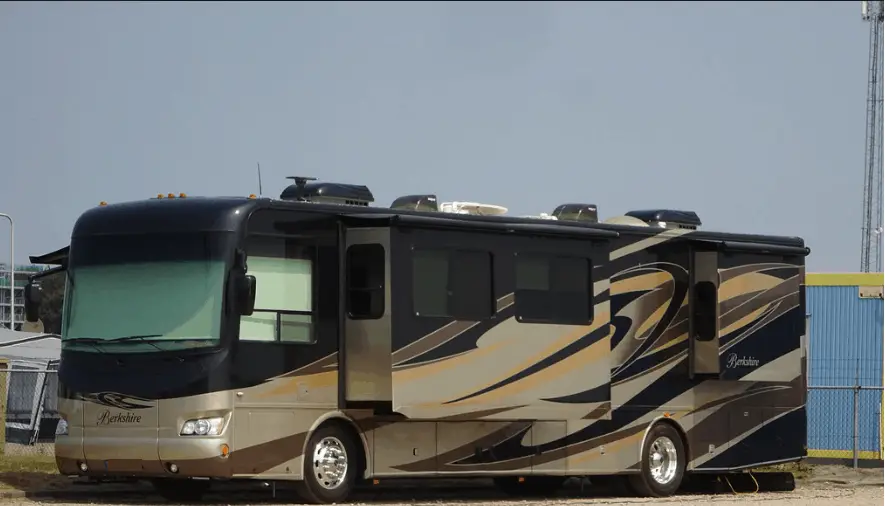
- BEGINNERS GUIDE
G. Yoganand
Air Conditioning units (AC) on RV’s can be a great asset for those that spend a lot of time in them. But, on some occasions, some sort of deterioration or leakage can occur.
However, these may not be a very difficult situations to fix and it is possible for one to do it at home, provided that the right tools are used.
Troubleshooting a not working AC may not be difficult if you have basic knowledge about AC’s. Most RV’s are equipped with AC’s from atwood, coleman, dometic or advent. We recently replaced our old ac with a Dometic Brisk II Rooftop Air Conditioner (check current price and reviews on amazon). Its an awesome product, easy to install and replace.
In this article, lets explore common issues that we face with RV air conditioners and how to troublshoot them.
Assessing the problem
When you detect that something is wrong with the Air Conditioning unit of your RV, the first thing to do is to see exactly what the problem is, in order to properly fix it. Now, it is important for you to keep in mind how old and how often your AC is used, as that can also influence the problem.
One can face varying issues with camper AC’s like “the RV ac shuts off on its own”, or the AC turns ON and OFF repeatedly or sometimes the AC wont blow cold air at all. There can be issues with the thermostat, or the capacitor in the air conditioner. So, how do you identify and repair these issues?
Read : How to install a portable Air Conditioner in a camper
AC units are complex enough and may not always be fixed by RV owners. RV AC professional becomes a must then. But, sometimes its better to understand the problem and see if you can get it fixed yourslef.
Fixing the problem
Different problems ask for different solutions. Once you have determined what is wrong with your Air Conditioner, then you can move on to fixing it. Lets check out different problems that rooftop AC on RV or travel trailer can face and how we can fix those problems.
1. The AC Does Not Turn “O N”
When you have an Air Conditioner in your RV, usually you want it to work, and so, it can be quite frustrating when it doesn’t. The first step towards fixing it is to check for battery in the remote. Although AA and AAA batteries are known to last for a very long period of time, cheaper brands can wear out sooner than expected.
Generally, changing batteries should be sufficient, but if it is not, then the next step is to check whether there is anything broken in the remote. If your remote seems to be in good condition, then a simple, yet overlooked step is to check whether the electricity in the RV or motorhome is on.
2. The Air Conditioner Blows Out Hot Air
If your AC is blowing out hot air, then the first step is to check the thermostat. If however, you set the temperature right and the AC keeps blowing out hot air, then it is possible that the problem itself is in the thermostat.
To fix this, you will need to disconnect the wires leading to the thermostat and then attach them together, bypassing the thermostat entirely. If the AC starts working properly, then it is definitely a broken thermostat, to which you will need to buy a new one.
3. The Air Conditioning Unit Motor is Unusually Loud
AC units are usually very smooth and silent and so, it is easy to notice when it starts acting up and making a lot of noise. This noise is very likely caused by the fact that the rubber shock absorbers are not in their rightful place.
To fix this issue, you will need to remove your AC unit shroud, find the rubber shock absorber and make sure that they don’t brush up against the fan or compressor coils. Here is a detailed guide on how to quiet your rv ac .
4. There is Ice on Your Air Conditioner
Although it is not a very common issue, ice can appear on the outer part of your AC unit. The problem itself is related to the Freon levels in your AC unit, but it is a rather easy problem to fix. The first thing you need to do is check if there are any leaks.
If you can’t seem to find a leak, then all you need to do is to top off your AC’s Freon. Afterwards it should work well again, not producing that unwanted ice.
5. The Air Conditioner Has a Foul Smell
Air Conditioners don’t usually leave smells, but on rare occasions, an uncomfortable smell can appear. This can happen when the filters aren’t regularly cleaned or replaced. If you do clean the filters and the smell remains, then the problem comes from the radiator. To fix this, you will need to clean all the dirt. Doing that should fix the problem.
6. The AC doesn’t stop running
If you notice that you try to turn off your AC unit, but it keeps running, then you will have to fix it right away to prevent damaging of the machine or decrease in longevity. There are a few reasons as to why your AC unit won’t turn off. First, it could be a busted thermostat, in which case you will have to replace it with a new one. If that does not appear to be the issue, then the circuit board could be affected, and so you will have to hire a professional.
7. The Air Conditioner is Leaking
Leaking is a common problem when it comes to Air Conditioners in Recreational Vehicles. Checkout my previous post on how to fix leaking RV air conditioner . Here, it is important for you to check whether it leaks when the AC is on or when it rains, and maybe even if it leaks in both situations.
Now, Air Conditioners are sealed to the rooftop of the RV with a rubber gasket. This gasket is usually very low-maintenance and so will require little attention. Nevertheless, if you start noticing that there is a leak, then you definitely should try to fix it as soon as possible, before it becomes a long term problem.
That being said, the first step towards fixing it would be to verify if the rubber gasket is intact. To do this, you will need to check whether there is at least) half an inch of height in the gasket between the Air Conditioner and the RV itself. If the rubber gasket really is the problem, then you will need to replace it with a new one.
Here, you can either hire a qualified RV air conditioning specialist or do it yourself. If you wish to do it yourself, then you will need a few tools:

- Screwdriver
- Wire cutter
- Rubbing alcohol
Once you’ve gathered all the necessary tools, then you can move on to fixing it. We carry this Black and Decker RV toolkit (amazon link) in our rig, it has most basic tools. That’s very helpful in fixing and installing appliances on RV.
First of all, you will need to remove the outer part of your AC, also known as shroud, in order to reveal its inner parts. After this is done, you will have to locate the bolts and remove them, placing them in a bag, so that you’ll find them easily when needed. Then you should carefully remove the shroud and set it aside, where you can easily reach it later.
The next step is to remove the Air Conditioning unit from the roof, as it will be much easier to work with. Remove the screws that hold the AC unit to the rooftop of your RV and set them aside. Then, you will need to observe whether there is an electrical connector and, if there is, what sort of connection there is.
Before cutting the three wires attached, you will need to make sure that the power is disconnected. Once it is disconnected, then you can proceed to cutting the three wires with a pair of cutters. After that, removing the Air Conditioner should be pretty easy, but be careful not to scratch the paint of your RV. Also, be vary of the fact that rv roofs support weight upto certain limit and therefore be careful when climbing up there.
Once the Air Conditioning unit has been removed from the rooftop, you can pull out the old rubber gasket and throw it away. If the rubber gasket is either stuck or hard to remove, use a knife to remove it.
Make sure that you remove all of the remaining residues and clean the entire rooftop with rubbing alcohol.
Moving on to the next step: Placing the new rubber gasket. On this step, you will need to return the AC unit to its rightful place, over the new gasket and reattach it, using the right tools. You will need to reconnect the wiring harness and then reattach the shroud.
Once your work is done, you will need to verify if everything is working properly. To do this, you should use a water hose to lightly spray the AC unit while it is running, and then check if there are any leaks.
Related Reading : Consider this before buying a RV Air Conditioner
Tips For The Future
Air Conditioners are practical and useful devices, but they do need some sort of regular maintenance, in order to function properly. Whether you own a class A motorhome or a fifth wheel or a small pop up camper, air conditioner are very important while camping.
That means that if you don’t wish to buy a brand-new AC unit every few years and don’t want to spend unnecessary money on air conditioning repair specialists, that you will have to dedicate some time to make basic maintenance a part of your routine.
Maintaining your Air Conditioner can be done in four easy steps:
1 . Protect from all elements
First of all, you need to protect your AC unit from all the elements. That means you should cover it when you are not using it. There are many covers out there for the buying and they are very easy to apply to your AC unit. This might seem like an expendable step, but it will protect your AC from dust and dirt.
2. Maintain and service the fan
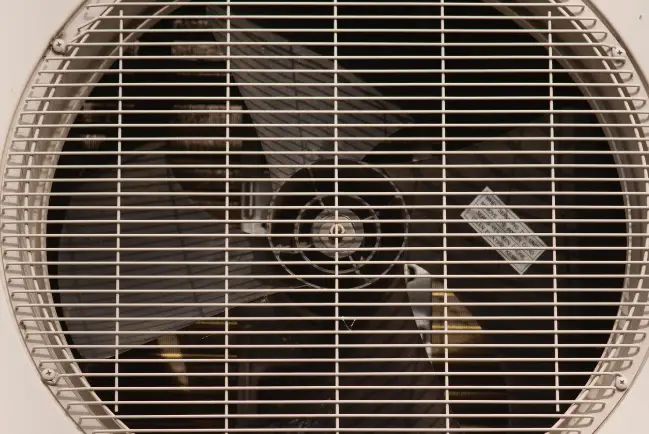
The second step is to oil your Air Conditioner’s fan. It will run much more smoother if it is properly oiled. Note that every AC is different, and so, you should reach for your manufacturer’s instructions, to ensure that you do it properly.
You should buy a high quality oil that is detergent-free, such as automotive motor oil, as cheap oils might wear out faster and could leave residues that could later on become a problem.
3. Inspect the AC Condenser
Step number three involves inspecting the condenser of your AC unit. This step is important, as its coils will provide you with the cooling you seek in the hot summer days.
It is important to occasionally check the condenser as it can accumulate dirt, dust and other debris (as it is exposed to the elements).
4. Air Out roof vents
This last step is a considerably important one, if you wish to keep excessive moisture away from your RV’s Air Conditioning Unit.
In order to do this, you will have to air out the roof vent. It is quite an easy step and it will help you avoid a lot of unwanted and unnecessary issues.
Related Read : How to keep your RV or travel cool without Air conditioner
Your RV Air Conditioner is an important component, but you can’t expect it to last for a lifetime, especially when left uncared for. Many of the issues that can occur in your AC unit can easily be fixed without the aid of professionals, so long as you get informed on how to fix it.
You should establish a schedule to help you know when to do a little cleaning and maintenance. The only thing you should always keep in mind is that all sorts of maintenance should be done while your AC unit is not running.
You Might Also Like

How to Tell If My RV Roof Is Fiberglass
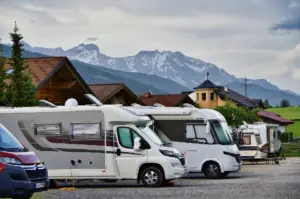
25 Overlooked RV Hacks And Ideas For Great RVing Experience

23 RV Boondocking Mistakes To Avoid
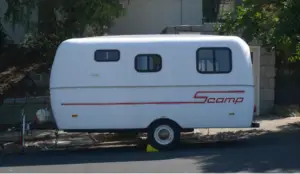
What should travel trailer tire pressure be?
Why Is My RV Air Conditioning Unit So Loud?
- No Comments
- Beginner Info
Travelling cross-country in an RV is one of the best ways to enjoy your summer vacation.
But if you do not have a quality air conditioner inside your recreational vehicle, you could be in for a very long and miserable trip. Even if your A/C is working but making a very loud noise, it could ruin some peaceful moments on the road. Not to mention that loud noise could be a sign that your air conditioner is about to malfunction.
Whether it is the slight clicking of the compressor or the loud rattle of loose nuts or bolts, the ongoing racket could be enough to ruin your peaceful family road trip. The noise could be so loud that your RV’s radio will not drown the sound out, or it could be just noisy enough to be annoying.
There are many reasons why your RV’s air conditioner may be making weird noises while it’s on. Here we will discuss the many different causes of a loud air conditioner and how to solve the problem.
Why is My RV’s Air Conditioner Loud?
The air conditioners on RVs are naturally loud machines. The vibrations caused by the A/C can make them sound even louder even if there is no issue.
One of the leading causes of excessive noise from your air conditioner is the buildup of dirt and grime inside the system. It can cause a problem with how the machine functions because it can block airflow.
The best way to prevent issues with noise is to keep up regular maintenance of your air conditioner. However, if your A/C has other issues that are not caused by noise, it may be best to have it repaired or replaced.
Depending on the type of air conditioner you have and how old your RV is, some easy repairs could help decrease the noise. But before you begin the repair process, you need to understand what the cause of the problem is.
When conducting routine maintenance on your RV and its AC unit, paying close attention to all the major areas that could lead to excessive noise is essential. If checking these areas does not help resolve the issue, it may be time to replace your air conditioner instead.
The Fan Motor
After removing the air conditioner unit’s housing, you will find the fan motor attached to the main fan. Issues with fan motors are one of the most common problems for owners of older RVs. The fan motor works all the time, and it is common for them to break, which can lead to excessive noise. If this is the primary cause of your noisy A/C, you will need to replace the fan motor.
Fittings that are Loose or Too Tight
The consistent rattling noise you may be hearing could be a fitting that became loose after hitting too many bumps in the road. If you suspect you have fittings that are too tight or too loose, you should inspect your A/C unit and either tighten or loosen them if needed.
The most common area for this issue is the mounting bolts. These bolts can become too tight, which will often cause your air conditioner to shake and create noise throughout your RV. You should always have these bolts secure but never too tight.
Worn Rubber Cushions
While your air conditioner is making too much noise, it could also be hard at work trying to eliminate the noise as well. The rubber cushions within your air conditioner help absorb the vibration of the unit and its components.
When these cushions start to wear down, you will notice more noise than usual. Replacing worn rubber cushions in your A/C will not only help reduce the amount of noise you hear but will also help to add more protection to your A/C’s components as well.
Overworked A/C
Air conditioners are designed to keep your RV cool, but if you are using your unit too much, you could be overworking it. Over time, excess wear on your air conditioner will cause it to malfunction, and that will lead to excessive noise.
Be mindful of how much pressure you are putting on your air conditioner. If you are driving through hot climates constantly, you may want to consider replacing your current A/C unit with one that has higher BTUs. It also may be necessary for you to replace your air conditioner’s components.
You can do this on your own if you have some experience with electrical and maintenance work. Otherwise, you will need to take your RV to a professional for assistance.
How to Reduce the Noise of an RV’s A/C
Routine maintenance and regular checkups are the best way to reduce noise with your RV’s air conditioner. When inspecting your A/C, you will need to pay attention to the following components.
- Condenser Coils
- Evaporator Coils
To help eliminate noise, you should make sure the components inside your A/C unit are free of dust, dirt, debris, and other obstructions. You may need to consult with your owner’s manual to gain access to some of these areas if you are not familiar with navigating the inside of your A/C unit.
One tip that may be helpful is to apply oil to your fan motor. The motor is constantly working while your unit is on, and adding the right amount of lubrication to it will prevent wear and help it stop making so much unwanted noise.
Remember, when addressing issues with a noisy air conditioner, it is always best to address the possible issues that are easiest to fix first before you attempt to repair more complicated components.
Start by inspecting the fittings on your units first. Look for any loose nuts or bolts that may be causing the problem. This fix will require the least amount of effort from you. Be sure that you pay close attention to the bolts found on your mounting brackets, which you can find on the air conditioner’s central unit.
After you have addressed the most common issues and have found no problems, it is time to move on to other possible problems. You will need to check and make sure everything is in the right location.
Look at all the rubber cushions and make sure they contact your fan’s motor as well as with the condenser coils. If the cushions do not contact these components, it will cause the A/C unit to shake and rumble. Simply replacing the worn or malfunctioning cushions can help to remedy this issue.
If the cushions are functioning as they should, the problem may be with your fan motor. Replacing this can be a complex DIY project that requires you to know about electrical appliances. If you have any questions, be sure to consult with a professional for assistance.
Can You Purchase a Quieter Air Conditioner?
If you want to replace your old A/C unit entirely, you may be interested in finding one that runs quieter. When it comes to finding the quietest air conditioner unit for your RV, there may be several options out there for you to consider. But keep in mind that a quieter A/C may not perform as well as you expect. For that reason, you should do your own research on various A/C models and find the one that will work best for you.
There are several things to consider when buying a new RV air conditioner, aside from just the noise. You will want to look at features such as:
- Whether the unit is ducted or non-ducted
- Dimensions like Height, Weight, and Shape
- Power Usage
- BTU and Cooling Capacity
You will need to consider all of these things when shopping around for a new A/C unit. And you should also consider the unit’s placement, such as whether it is located on the rooftop, in a window, or under the bench and hidden from view inside your RV. Finding the ideal spot for your A/C unit inside your RV will also help to resolve noise issues.
Can You Soundproof an Air Conditioner?
Depending on the type of air conditioning system you own, you have several options available for soundproofing.
Air conditioner silencers are sound reduction kits that consist of sound dampening materials to muffle a noisy unit. Remember that the type of kit you buy depends on whether you have a ducted or non-ducted unit.
With a ducted unit, you can use a kit that will pad the ducts with soundproofing material. Some are even designed to help improve your unit’s airflow as well. These soundproof kits are typically easy to install and can significantly reduce the noise throughout your RV by as much as 10 decibels.
How Loud Should an A/C in an RV Be?
One of the reasons why air conditioners on RVs are so loud is because of the limits these units have when it comes to space. When designing RVs, the manufacturer’s main goal is to find ways to prevent the A/C unit from taking up too much space. And while that can be useful, this can also contribute to the problem with loud noises.
The average decibel range for an RV air conditioner is around 55 decibels. If your unit is running significantly louder than that, you could have an issue with your unit. To help put decibel ranges into perspective, 50 decibels is the common level for a quiet conversation at home, while 70 decibels is the standard range for a typical vacuum cleaner.
Because your RV air condition has to fit in such a small location, such as the narrow space of a camper roof, their units are often stripped down to the basics. It can take away the insulating layers that protect the unit and help eliminate noise.
RV air conditioners have seen some slight improvements in recent years when it comes to their decibel range. Still, they will always have to work a little harder than your standard window air conditioners designed for residential use due to their compromised design.
How Many Years Will an Air Conditioner Last in an RV?
The number of years your RV’s air conditioner will last is based on several factors. These include the quality of the A/C mode, how often it is used, and the level of maintenance performed on the unit.
As a rule of thumb, you should expect your new A/C unit to last between three to five years if you have a good quality brand that is used often. It may last a little longer if it is well maintained over the years.
There are a few things you can do to help improve the lifespan of your RV’s air conditioner.
Weatherize your A/C
Performing weather protection by adding weatherproof material to your air conditioner unit will prevent it from becoming damaged over the years due to exposure to dirt, rain, and harmful UV rays.
Check for Leaks
By regularly checking for leaks, you will keep a close eye on the seals and gaskets within your unit. Doing this will let you know if they are worn or cracked due to exposure to the elements. Checking for leaks on a routine basis will also help you determine if your A/C has any water damage.
Monitor Cooling Fins
The cooling fins on your RV’s A/C should be in excellent working condition. If they are bent, it can reduce the airflow and decrease the lifespan of your unit. If you notice any issues with your cooling fins, you will want to repair or replace them as soon as possible.
Clean the Filters
It is essential to keep your filters clean and change them often. A dirty filter will cause your air conditioner to work extra hard to produce the cool air you need. Failure to clean your filters will reduce your unit’s lifespan.
A quality air conditioner is essential for your summer road trips in your RV. Therefore, it’s essential to address any concerns you may have with a noisy A/C unit and find out the cause to ensure you are not stuck in the hottest cities in the U.S. without access to cool air.
By understanding more about how your air conditioner works, you can learn how to easily troubleshoot the unit whenever problems such as unnecessary noises begin to occur.
Leave a Comment Cancel Reply
Your email address will not be published. Required fields are marked *
Save my name, email, and website in this browser for the next time I comment.
- Latest Blogs
- Troubleshooting
- Product Reviews
- How-To Guides
Copyright Campervan Lifestyle 2021
Automated page speed optimizations for fast site performance

AC All Solutions
Blog by Skilled About Air Conditioners
Rv Air Conditioner Making Pulsating Noise: Troubleshooting Tips
If your RV air conditioner is making a pulsating noise, it may be due to a loose coil fan or fan blade that needs tightening or replacing. Consider a tune-up of these items, as it might solve the problem immediately.
A pulsating noise coming from your RV air conditioner can be frustrating and disruptive. It can indicate issues with the fan, motor, or compressor, potentially leading to larger maintenance problems if left unchecked.
In this guide, we’ll explore the common causes of pulsating noise in RV air conditioners and provide practical tips to address and mitigate the issue effectively.
By identifying and resolving the source of the pulsating noise, you can restore peace and comfort to your RV living experience. Let’s delve into how to troubleshoot and rectify pulsating noises in your RV air conditioner.

Credit: www.rvrepairclub.com
Table of Contents
Identifying Common Culprits
When your RV air conditioner starts making a pulsating noise, it can be both annoying and concerning. Identifying the common culprits behind this issue is crucial for effective troubleshooting and maintenance.
Here are the key factors to consider when pinpointing the source of the pulsating noise from your RV air conditioner:
Signs Of A Loose Fan Or Blade
A loose fan or blade in the RV air conditioner can result in a pulsating noise. This may require tightening or even replacing the fan or blade.
Conducting a thorough inspection and tune-up of these components can potentially resolve the issue and restore smooth operation to the air conditioner.
Issues With The Compressor And Sound Waves
Pulsating noises in RV air conditioners are often associated with sound waves emanating from the compressor. If the AC unit is installed on a plastic pad, it is important to assess whether this setup is contributing to the issue.
Additionally, assessing the condition and mounting of the compressor is essential in addressing potential issues related to sound wave pulsation.
Importance Of Secure Mounting On Pads
Ensuring that the RV air conditioner is securely mounted on pads is crucial for minimizing pulsating noises. Unsecured or improperly mounted units can lead to vibrations and sympathetic vibrations in other components, such as the roof panel, resulting in pulsating sounds.
Proper installation and secure mounting on appropriate pads can mitigate these issues.
Cleaning And Maintenance Essentials
When it comes to your RV air conditioner, ensuring proper cleaning and maintenance essentials can significantly impact its performance and longevity.
From regular cleaning of condenser coils to checking refrigerant pressure implications, addressing these key aspects can help resolve pulsating noise issues and ensure optimal functionality of the air conditioning unit.
Regular Cleaning Of Condenser Coils
One of the essential maintenance tasks for addressing pulsating noise in RV air conditioners is the regular cleaning of condenser coils. Over time, these coils can accumulate dirt, debris, and grime, leading to inefficient heat exchange and potential strain on the compressor.
By cleaning the condenser coils on a routine basis, you can maintain proper airflow and heat transfer, reducing the likelihood of pulsating noises and enhancing overall air conditioning performance.
Checking Refrigerant Pressure Implications
Another critical aspect of maintenance is checking refrigerant pressure implications. Pulsating noises in air conditioners can stem from issues with refrigerant pressure , often caused by dirt-clogged coils or inadequate refrigerant levels.
Regularly monitoring and maintaining optimal refrigerant pressure can mitigate potential pulsating noise concerns and prevent compressor strain, ensuring the smooth operation of your RV air conditioner.
When performing routine maintenance on your RV air conditioner, it’s essential to adhere to manufacturer guidelines and schedule professional inspections as needed.
By prioritizing cleaning and maintenance essentials, you can proactively address pulsating noise issues and promote the longevity of your air conditioning unit, ultimately enhancing your overall travel comfort and experience.
Sympathetic Vibrations And Fixes
Is your RV air conditioner making a pulsating noise that is causing discomfort during your travels? If so, you may be experiencing sympathetic vibrations from the roof panel due to the vibrations coming from the A/C unit.
Fortunately, there are effective strategies to diagnose and fix these sympathetically induced pulsating noises.
If your RV air conditioner is producing a pulsating noise, it may be attributed to sympathetic vibrations of the roof panel caused by the A/C unit’s operation.
These vibrations can create a rhythmic pulsing sound, disrupting the peace and comfort of your RV environment. To diagnose this issue, consider inspecting the roof panel and the A/C unit for any signs of movement or loose components that could be contributing to the sympathetic vibrations.
Dealing with sympathetic vibrations involves identifying the root cause of the pulsating noise and implementing measures to minimize or eliminate the vibrations.
This may include checking for loose fan blades, coil fans, or other components within the A/C unit that could be contributing to the sympathetic vibrations. By addressing these underlying issues, you can effectively mitigate the pulsating noise and restore a peaceful environment within your RV.
Securing the A/C unit is essential for preventing sympathetic vibrations that lead to pulsating noises. Consider implementing the following strategies to secure the A/C unit and minimize vibrations:
- Tightening or replacing loose coil fan or fan blades
- Inspecting and cleaning condenser coils to prevent pressure fluctuations
- Checking and securing the A/C unit on a stable, non-plastic pad
- Inspecting the fan motor for any signs of wear or malfunction
- Ensuring proper sealing of refrigerant lines to prevent air entrapment
By implementing these strategies, you can effectively address sympathetic vibrations and resolve the pulsating noise issues caused by your RV air conditioner, ensuring a quieter and more comfortable travel experience.
Mechanical Checks For Pulsating Noises
When your RV air conditioner starts making a pulsating noise, it can be quite unsettling. However, there are a few mechanical checks you can perform to diagnose the issue and potentially resolve the problem without the need for professional assistance.
Inspecting For Nests And Debris
Before delving into the internal components, it’s important to ensure that the external unit is free from any obstructions. Check for any nests, leaves, or debris that might be causing the pulsating noise.
Insects or small animals can also create nests in the RV air conditioner, causing similar symptoms. Clearing away any such obstructions can make a noticeable difference in the noise levels.
Assessing The Fan Motor’s Condition
The fan motor plays a crucial role in the functioning of the RV air conditioner. Inspect the fan blades for any signs of wear or damage. A loose or damaged fan blade can cause pulsating noises as the unit struggles to maintain steady airflow.
Additionally, listen for any growling sounds which could indicate bearing failure in the motor. If the bearings are faulty, they may need to be replaced to eliminate the pulsating noise.
Recognizing Signs Of Bearing Failure
Aside from the fan motor, it’s important to be aware of signs of bearing failure within the RV air conditioner. This could manifest as a rhythmic humming sound or a noticeable increase in pulsating noises.
If left unattended, bearing failure can lead to more severe issues within the unit. Checking for any abnormal sounds or vibrations can help in identifying and addressing potential bearing issues.
When To Seek Professional Help
If your RV air conditioner is making a pulsating noise, it could be due to a loose coil fan or fan blade. Consider seeking professional help for tightening or replacing these components.
Additionally, check for dirty condenser coils and inspect the fan motor for any issues to ensure proper maintenance and avoid more serious problems in the future.
Understanding When Diy Isn’t Enough
If you’ve found yourself dealing with an RV air conditioner making a pulsating noise, it’s crucial to assess the situation and consider when it’s the right time to seek professional help.
While some issues may be resolved through basic DIY troubleshooting, there are instances when the expertise of a professional is imperative to ensure the safety and proper functioning of your air conditioning system.
Identifying Serious Refrigerant Line Issues
When confronted with pulsating noises coming from your RV air conditioner, it’s essential to recognize potential underlying refrigerant line issues.
Pulsating sounds can often be linked to refrigerant pressure irregularities caused by factors such as dirty condenser coils or inadequate sealing of the refrigerant lines.
Identifying these serious issues early on can prevent further damage to your air conditioning unit and ensure efficient cooling performance.
Recognizing The Limits Of Home Repairs
While it’s tempting to attempt resolving issues with your RV air conditioner independently, it’s important to acknowledge the limitations of home repairs.
Pulsating noises may be indicative of complex internal mechanical or electrical issues that require specialized knowledge and equipment to rectify.
Recognizing when the expertise of a professional HVAC technician is necessary can prevent potential safety hazards and costly damage to your air conditioning system.
Frequently Asked Questions For Rv Air Conditioner Making Pulsating Noise
Why does my ac sound like it’s pulsing.
The pulsating noise in your AC could indicate a loose fan blade or coil fan in the motor system. Tightening or replacing them may resolve the issue, while dirty condenser coils can also cause pulsating. Regular maintenance can help prevent further problems.
Why Is My Ac Making A Rhythmic Humming Sound?
Your AC is likely making a rhythmic humming sound due to a loose fan blade or coil fan. These could need tightening or replacing. It’s crucial to address this issue as an unchecked vibration could lead to more serious maintenance problems.
Regular tune-ups can help prevent these issues.
Why Is My Rv Ac Making Weird Noise?
Your RV AC may be making weird noise due to a loose coil fan or fan blade. This can be fixed with tightening or replacing. Another possibility is the sound waves coming out of the compressor. Check for a loose coil, fan blade, or dirty condenser coils. Regular tune-up is also recommended.
Why Is My Ac Making A Fluttering Sound?
Your AC may have a loose coil fan or fan blade, which might need tightening or replacing. It could also be due to sound waves coming out of the compressor, or a problem with the condenser coils. It’s essential to schedule a tune-up to address these issues promptly.
If you are experiencing a pulsating noise from your RV air conditioner, it could be due to a loose fan blade or coil fan within the system’s motor. Regular maintenance and inspections can prevent these issues from escalating into more serious problems.
Keep an ear out for unusual sounds to catch any potential issues early on.
Related posts:

Leave a Comment Cancel reply
Save my name, email, and website in this browser for the next time I comment.

6 Tips for Making Your RV Air Conditioner Quieter

One of the reasons you travel on vacation to the vast outdoors is to escape the city sounds. Nature is tranquil and calm, and you appreciate the times when there is no noise bugging you. Then you activate your air conditioner.
Table of Contents
How to Make the Air Conditioner in Your RV Quieter?
It may appear like your RV’s air conditioner is driven by a jet engine, but they may be quieted down. It is sometimes enough to tighten a few nuts and bolts to lessen noise.
The age and manufacturer of your RV’s AC unit will determine how quiet it can be. Continue reading for some helpful hints on how to experience more peace and quiet when out in nature.
Tip no. 1. If your RV has an older air conditioner, there is little you can do to reduce noise. One solution is to inspect the bushings to ensure they are not loose.
Tip no. 2. It’s possible that your fan blades are dusty and out of balance. A thorough cleaning will quickly resolve the problem.

Too Noisy RV Air Conditioner
There are several reasons why your roof top air conditioner creates such a lot of noise. One major cause is that it is getting too old and is nearing the end of its life. When this happens, you should think about replacing the air conditioner with a more modern model.
Another issue is that the rubber cushions have hardened with time and no longer absorb vibration as efficiently as they once did. A third possibility is that the vibration of the AC unit loosened many nuts, bolts, or screws. You’d have to climb up there and inspect, then tighten any loose hardware you find.
Tip no. 3. If your air conditioner is producing too much noise, it may be cheaper to replace it with a newer model rather than attempting to repair it.
RV Air Conditioner Silencer
If you are not mechanically inclined, there is still some good news when it comes to lowering the noise level produced by your air conditioner. It’s called a Dometic RV AC silencer, and it takes approximately 15 minutes to install.
If properly fitted, this variant of an AC silencer can reduce noise levels by 8 to 10 decibels. The key is found in all of its components. One tactic they employ is to place recycled cotton lining inside the duct system to ensure that noise is suppressed before it enters the house.
The filtration system is very simple to maintain. After installation, you should be able to enjoy some peace and quiet.
Tip no. 4: Reduce the fan speed from high to low to silence your RV’s air conditioner. Choosing the simplest remedies will save you time and money.
Is a Quiet RV Air Conditioner Available?
Yes, a quiet RV AC unit is available now. However, it is possible that none of the older models have it. As technology advances, it discovers new ways to design RV air conditioners that are also quieter.
However, having a whisper quiet air conditioner does not guarantee that you will not hear the air conditioner in your RV. When you switch them on, they will still make noise. Only the noise level will be lower than in other models.
It is also feasible to obtain 15,000 BTU units that produce very little noise when operating. Newer RV air conditioners are developed and constructed with your comfort in mind. That suggests researchers are putting forth the effort to solve the noise problem.
Tip no. 5. To reduce noise, you might try opening your air conditioner from the inside and inspecting the ducts. Checking the fan wheel to verify if it operates properly, then repairing any problems to help reduce noise.

RV Air Conditioner with the Lowest Noise Level
You may actually choose which RV AC unit is the quietest. In terms of noise suppression and sound output, they are all quite close. First, there was the whisper. Quiet models, such as those seen in Jaycee and Excel RVs, create very little noise. This is due to its dual duct system.
These whisper quiet variants are also available on 5th wheel trailers. They are no taller than normal air conditioning units. A low-profile Coleman air conditioner is another good option.
These units are designed to prevent noise from interfering with your other activities. Its compressor cycles on and off, so there may be some initial startup noise.
A Dometic roof top model is the final silent RV air conditioner on this list. It also has an on/off compressor and may be a little noisier than the Coleman. However, pound for pound, this Dometic will compete with the Coleman for quietness.
If a winner were to be chosen, the Coleman would be the quietest of the three roof top versions.
Tip no. 6. Make sure all of your air vent registers are open. Because of the restricted air flow, the fan makes more noise than usual. Some Closing Remarks
Getting peace and quiet when you’re out and about can appear to be a challenging undertaking. That is, if you own an older RV with an air conditioner that is nearing the end of its useful life.
To resolve the problem, you may need to replace the old air conditioner with a newer, more current model. If you don’t have the funds for that, use the methods above to determine if there are any other issues producing the noise.
Fix those, and you’ll be able to enjoy your RV’s air conditioner for a little while longer. Make sure to clean your filters, fans, and duct system on a regular basis. Restricted air flow can disrupt the operation of an air conditioner and cause it to make additional noise.
You might also want to read these RV Camping Tips and Guides:
The Winnebago Micro Minnie: Seven Things You Should Know
How long can you keep an rv air conditioner running, quietest rv air conditioners tested.
- All the Small Camper Vans to Fuel Your “Van Life” Dreams
- What Are the Common Winnebago Micro Minnie Issues?
Top RV Air Conditioners in 2023

An RV is all about seeing the country in comfort. This necessitates the use of a good air conditioner to keep the interior cool and comfortable on warm, warm, and…
How to Determine the Best Used RV Price

How to Determine the Best Used RV Price It’s that time of year again, and the weather forecast looks promising for camping and RV activities. Looking for a new RV…
How to Purchase an RV

Before you pull the trigger on one of the larger purchases of your life, consider some of these finer points on how to efficiently purchase an RV. Let’s take a…
Best RV Air Conditioner: Top Models for Efficient Cooling on the Go

Traveling in an RV offers the perfect blend of adventure and comfort, but extreme temperatures can compromise the latter. An efficient air conditioner becomes a vital feature, pivotal in maintaining…
All You Need To Know About RV TVs

Because there are so many factors to think about, shopping for an RV TV might be overwhelming. You must first decide on the kind of television technology you want, the…
The Top 5 12 Volt TVs for Your Campervan or RV

What Should a 12V TV for Campervan or RV Contain? (6 Items) You are aware that your campervan or RV needs a TV, but what should you seek for? I’ve…
FAQ: Can RV Air Conditioning Run Continuously?

Can I operate my RV’s air conditioner continuously? Without creating a problem, you can leave the air conditioner on continually in your RV. Set your thermostat a little lower if…
How do you choose an RV air conditioner?

Regardless of the kind of RV air conditioner you pick, make sure to do your homework and read reviews from other RVers before making a purchase. No matter where the…
Best of Micro Camper Necessities 2023

Best of Micro Camper Necessities 2023 Are you going on your first Micro Camper vacation? Let’s speak about getting ready for an early season adventure in your Micro Camper. It’s…
The Top 5 RV Air Conditioners Units for 2023 (15,000 BTU Rooftop)

In the summer, Vs can become extremely hot. An RV is essentially a metal cage with no inside. The metal box will quickly become warm when left in the sun,…

One of the most well-known lightweight campers on the road today is the Winnebago Micro Minnie. Thanks to its high-quality building, market-leading features, and a variety of well-designed floorplans. But…

A Complete Guide on How Long an RV Air Conditioner Can Run The best time of year to travel in an RV is during the summer. However, you must make…

The tremendously loud noise that camper AC units make is one of the most common complaints. After a few sleepless nights, you’ll start looking for the quietest RV air conditioners…

37 RV Air Conditioner Troubleshooting Tips And Maintenance Plan UPDATED
Rv air conditioner troubleshooting tips and maintenance guide.
If properly maintained, the RV air conditioner units, rooftop or not in travel trailers or any kind of RV, will provide you several years of cooling efficiency.
This article is divided into two segments or parts:
- The first segment discusses the process of troubleshooting your RV air conditioner unit and deciding on the parts to service or replace,
- The second part of the article is about maintaining your RV AC unit and also decide on the purchasing of spare parts and having a planned maintenance schedule of the unit.
These maintenance and repair tips are easy to follow, whether or not you have practical experience.
Background Information on the Workings of an AC
If you are not familiar with the workings of a motorhome air conditioning, this article will show you the parts to service, check and repair.
Just to begin, an introduction. An RV air conditioner is made up of a compressor – for circulating cooling fluids such as Freon through the fins and coils of its condenser – and the fan. The fan is responsible for blowing cooled air across the RV.
The compressor and fan are controlled by a thermostat. They are also kickstarted by the capacitors. The 12-volt electrical system is used to run the AC thermostat and other similar controls.
Where to Start
The vast majority of the RV air conditioner issues are caused because the users do not change filters, do not lubricate bearings, and do not clean coils.
With that said, I am sure that many problems faced by air conditioners – like going off prematurely or sluggish behavior can be fixed by checking the electrical system. The problems are often not as complicated as we think, which is why it is advisable to start with the most straightforward possibilities. And if the problem persists, you can carry out further investigation to decide on whether to replace items like compressor and fan or to just get a new air conditioner.
We have decided to start by addressing the basic electrical issues.
RV Air Conditioner: Electrical Issues
Make sure the electrical supply to your unit is switched off before attempting to carry out any repair or maintenance on your rooftop AC unit. You either trip the AC breaker or unplug the unit from its electrical receptacle.
Part 1: Troubleshooting Of The RV Air Conditioner
Common RV AC Issues that You Can Troubleshoot on Your Own
- If you notice any unusual noise from your AC or it stops working, check to be sure the controls and units are getting adequate power.
- If you notice that your AC compressor or fan has stopped blowing air, is slow to start, blows warm air, blows weakly, trips your breaker, stops working after a while or dims your light, check the capacitors and have them replaced if necessary.
- If it is not blowing air, check your fan capacitor and the compressor capacitor if it is not cooling.
- If there is nothing wrong with the capacitor, crosscheck to ensure that power is actually being transmitted to the thermostat by checking if the 12-volt appliances are functioning.
- Check the thermostat function if wall-mounted. And if the unit only works when the thermostat wires are connected, it means that there is a problem with the thermostat. A thermostat is pretty easy to replace.
- If the thermostat and capacitor are in good condition, the defect may be with the control board.
- If there is nothing wrong with the control board, you may need to change the compressor or fan motor.
- The fan motor is probably bad if the fan can only work at a specific speed.
- You can choose to rebuild the fan motor. Or you can have the fan motor replaced if you feel the unit is otherwise in good shape.
- A compressor that malfunctions should be replaced, not repaired.
- If your system overheats or drips, it could mean your coils need to be cleaned.
- A leaking AC might mean that the gasket is leaking or the bolts are loose.
- If ice builds up in the system or it becomes very cold, it may mean the system is low on Freon.
- If you notice that your unit is noisy, it could be that something is interfering with the motors; this can be checked by getting rid of the shroud.
- Overheating can be caused by dirty coils. Clean coils can release excessive heat into the air.
- If you notice water leaking into from your AC, check it out to know the origin of the water. The leak may be from the gasket located between the roof and the unit; if this is the case, it is actually easy to fix. Carefully tighten the bolts, and if that fails, have the gasket replaced.
- The dripping from the unit may be due to the presence of condensed water in the wrong location (usually the pan located underneath the air conditioner) where the fan cannot evaporate it. This type of water buildup can be attributed to dirty coils and can be fixed by having the coils cleaned.
- If your unit is producing very cold air, building ice or even stops cooling completely, it may mean the unit is low on Freon. Visible oily residues can be seen around the Freon leak occasionally. You can use a self-piercing valve to attach the Freon to the system.
- You can fix a noisy motor by removing the shroud i.e. cover of your roof AC unit, to see if everything is where it ought to be. The rubber shock absorber located on the fan and compressor may be the ones interfering with the motion.
Is Your Unit Receiving Adequate Power Supply?
A unit that fails to react as expected – i.e. making noise or coming on, might not be getting adequate power supply. Check the 12-volt panel to see if the fuse is still intact and that the breaker is still intact. The AC controls and the thermostat are run by a 12-volt power system.
AC units require very high voltage power and might be more than what a 15-amp power pole is capable of handling. So if you have two modern RV AC rooftop units, the units may end up drawing more power than the 30-amp power at the campground can handle.
Likewise, if the power drawn by the RV AC unit is more than what the system can handle, the fuse or breaker will shut down. Fortunately, most RV parks and campgrounds today come equipped with the 50-amp service required by modern multi-unit air conditioners.
Like the vent fans and lights in your motor home, 12-volt power is used to power the thermostat. And if any of these accessories is not functioning, then it means something is wrong with your 12-volt power. The power converter responsible for converting the high-voltage power to a 12-volt power might be bad.
Check Your Capacitors
The capacitor is used to store electricity to provide the compressor and fan motor with some much-needed boost while the RV AC unit is working. It is easy for a capacitor to become worse if the RV unit has been left unused for some time and is unable to offer that little push needed to give life to the motors. A bad capacitor can explode in a cloud of smoke without causing any damage to the unit.
If your compressor or fan fails to start, the starting capacitor might be malfunctioning. There are several symptoms of a bad capacitor: the unit hums while trying to start, it runs for a little while before it trips a breaker, while the fan requires a little push to start, or the bad compressor causes hot air to blow.
Capacitors are shaped like small batteries, buttons or flasks. You can use a multimeter to test your capacitor. A random value that decreases as the probe remains in place should appear on the thermometer of a good capacitor.

It is easy to replace a bad capacitor. When you want to order a new one, make sure you check the model numbers and required voltage of the old capacitor.
Be sure to put off the power when you want to replace it. Pay attention to where each wire goes, so you can use this information to install the newly purchased one in the exact same way. Do not use your bare hands to touch the terminals. Before you dismiss the old capacitor, make sure you use a screwdriver to connect its terminals (be sure to use an insulated screwdriver) to drain out the electrical charge.
Most AC units function well after their capacitor is replaced.
Crosscheck the Switches and Thermostat
A bad thermostat can also cause problems for your unit. You can use your multimeter to check the voltage of your thermostat if it is wall-mounted. If you notice that the only time the unit comes on is when the thermostat wires are touching each other, it means the thermostat is bad.
If your AC stops working and the capacitors and the thermostat are both okay, then the problem might be with the control board.
You can order new parts for your switches and thermostats online after locating the appropriate serial numbers and model. In most cases, these items are easily replaceable.
Do not forget to pay close attention to the wiring connections when you are replacing your electrical components.
The Checks In The Compressor And The Fan?
If after performing the electrical checks described above, your RV air conditioner keeps blowing at limited speed or refuses to blow air, it may represent that something is wrong with your fan motor. Sometimes, compressors and fans leak oil when they are under malfunction.
A functioning compressor should be warm to the touch and audible when turned on. You can use a clamp-on ammeter to test your compressor, a device that I recommend you to buy. Check the number of amps drawn by the compressor. If you notice that it is drawing more current than the required amp rating for the unit, the compressor is malfunctioning.
Replacing and Removing your AC Fan Motor
Oiling the fan motor is a great way to get it to run better. If after oiling, the fan motor of your AC is still slow to start, or requires a nudge to start, does not run at all, or runs at a certain speed, you might need to replace or rebuild it.
Don’t just use any oil for this; you can read the manual of the manufacturer of the RV air conditioner for advice about the most suitable oil. However, you need to be careful when buying oil for your fan, a cheap one can cause long term damage to your unit.
There are two types of fan motors: the ones with exposed bearings that are easy to lubricate and the ones with sleeved bearings. The first can be rebuilt cheaply and can last for years. However, the same cannot be said for the sleeved-bearing ones.
Sleeves fan motor, unlike bearings fan motors, cannot be rebuilt economically, so you will have to replace it with another one if it spoils.
If other aspects of your AC unit appear to be in good shape, you can get a new fan motor for your unit. Just change the motor, as in those cases, there is no need to change anything else.
You only need a few tools to replace your AC fan motor, as the job is quite straightforward. It is advisable for you to take note of the wires before you remove your old fan motor, especially if your motor’s electrical connection is not a simple plug-in.
Before you replace the AC shroud, make sure you test your new fan motor to check for fan clearance and proper alignment.
There Is Really No Need To Bother About Fixing a Bad Compressor
If after determining that there is nothing wrong neither with the relays, switches nor with the capacitor, the RV AC compressor is still unable to function properly and cool your air, you might have to consider buying a new RV air conditioner and discarding the old one.

Unless you are able to access some used compressors and can recharge and replace the system on your own, it will probably cost too much to fix it. Most compressors last longer than their warranty.
It might be easier to have the entire AC replaced
If you have finally decided to replace your entire RV air conditioner after analyzing all these possibilities, you will have to install a brand new device. The process of replacing your older unit with a new and efficient RV AC unit is actually a simple and straightforward procedure that you can handle on your own, as we explained in this article .
Problem: Your generator is fried.
It is not like you planned it. You tried to use your microwave with the RV air conditioner on. It never occurred to you that it will be a problem. And now you are living in a hot camper or travel trailer just because your RV AC unit has stopped working.
Solution: Get a new unit and monitor your wattage.
Sorry to say this, but once your generator is fried, there is nothing you can do about it. You will just have to take it out and purchase a new one. Make sure your new unit has at least 3,100 watts (better if it has more capacity). This wattage is not enough to carry both the RV air conditioner and the microwave, (so you might want to avoid that) but it is certainly enough to power your unit through the long summer.
Problem: You tried to test the temperature and ended up killing your generator.
This particular scenario is quite common: You tried to find out if your RV thermostat is still functioning. To achieve this you had to set the temperature as low as 50 degrees making it pretty frosty.
This is not something you will do on a normal day, but you just wanted to be sure that it can actually run at that particular temperature if it had to. The RV keeps getting colder and then suddenly it stops. Your unit suddenly goes off and so does your generator.
Solution: Do not even try to test the thermostat (and you will probably have to purchase a new generator).
If you run your AC temperature extremely low, it will definitely damage your generator. So you will need to purchase a new one.
There are probably a few instances where the weather becomes so hot, that you will want to turn your RV air conditioner all the way down to 60 or 70 degrees. However, most generators cannot handle anything below 60 degrees, so take note of that.
Problem: You failed to maintain your AC unit.
You need to clean and maintain your air conditioner regularly for optimal performance.
Imagine having to install a new AC in your RV just because you couldn’t keep the components clean enough.
Solution: Regular maintenance.
Below, in this article, we have a detailed walkthrough of all the steps for planned maintenance of your RV air conditioner.
Make basic maintenance part of your routine, to avoid this. Make it a point of duty to clean your unit at least once in six months.
Once a year, you can call a professional for a more exhaustive inspection, but if you follow closely the recommendations that I provide you in this article
Problem: Your AC unit motor has become annoyingly loud.
Your RV air conditioner used to run silently when you first purchased your RV. But as time went on it became annoyingly loud and it has become a nuisance that you ignore how to fix.
Solution: It is directly in the RV AC rubber shock absorbers.
There are some plausible explanations for why your air conditioner is humming, chugging or whining louder than usual. Your shock absorbers are probably not where they ought to be. And the rumble is probably caused by their contact with the compressor coils or fan.
To fix this, remove the cover of the RV AC unit, locate the shock absorbers, and ensure that they are not touching any of the other components.
Problem: Your air conditioner is surrounded by ice!
This can be quite scary because nobody wants to see their AC surrounded by ice no matter how cold they want it to be! So what is the solution?
Solution: Replace your Freon.
Do not worry, your air conditioner is not really making ice.
All these issues are connected to your RV air conditioner Freon levels. Sometimes Freon leaks happen, and when they do, you could end up with a freezing problem.
First, you look for any liquid leak around your air conditioner. If you don’t find any, then all you need to do is to top off the Freon. Once that is done, the unit will stop making ice and produce more cold.
Problem: Your unit is leaking and you don’t know why.
You have noticed that your RV air conditioner is constantly dripping and you do not even know why. Well, this happens also with proper maintenance.
Solution: Wipe the condenser coils.
The condenser coils are supposed to minimize water condensation. And when they become dusty or dirty they will not be able to evaporate the water. This is what causes dripping. So you may want to clean those condenser coils.
Inspect the RV air conditioner condenser. The condenser coil is what gives you that perfect cooling in the summer. The condenser and coils can easily become clogged with dirt, dust, leaves, and debris, which could prevent the AC from working. Make a habit of wiping your condenser bi-annually.
Problem: Leaking RV AC unit (Not The Same As The Dripping Issue).
The dripping may have stopped, but now you are noticing pools of water around your air conditioner. You clean it up, but it continues and you are wondering where is it coming from.
Solution: Replace or tighten the gasket.
The fact that your AC unit is in a pool of water does not necessarily mean it is leaking. The water may be coming from internal or external components.
Most times, such leaks are caused by the gasket. This is located near the roof of the unit. Secure all the bolts on the gasket for a start.
Give it a little time. If the RV air conditioner continues to leak water, then you might need to get a new gasket.
Problem: The AC unit overheats and gets very hot.
Though I am not recommending that you touch your air conditioner while it is running, however, if it feels hot or releases warm air when you are near it, then something is wrong.
In fact, the RV air conditioner sometimes powers itself down when it overheats.
Solution: Cleaning The Coils And Maintenance.
If you carry out regular maintenance on your air conditioner, this shouldn’t be an issue. Overheating is one of the problems of the condenser coil. Excessive dust and dirt in the coils can make the unit hot and prevent it from working.
Problem: Your AC unit is only blowing hot or warm air.
Nobody wants to suffer through hot streams of air in the scorching weather; your AC is on because you need a little cool air in your RV. So what do you do when this happens, are you going to junk your RV AC unit?
Solution: Test your motor voltage or get another one.
Before you decide to get a new motor voltage, test it to see if it is getting adequate voltage. If you notice that it isn’t, get a professional to fix it. However, if it is getting adequate voltage but is still not working, then you might have to get a new AC unit.
Problem: The AC unit is stinky.
Despite all your efforts, you notice that your AC unit has been emitting this horrible earthly stench. You have cleaned every part of the RV, from your freezers to the kitchen and bathroom, but the smell persists (I did it).
And then you realize that the smell is actually coming from your RV air conditioner.
Solution: Change the AC’s filters and clean the radiator.
Again the problem is caused here by lack of adequate maintenance. When was the last time that you have replaced your RV air conditioner filters? This can contribute to the smell, but the radiator is actually responsible for a large chunk of this smell. If you clean it properly, the radiator should be odor-free. You can also change the filters too since it can trap some of the bad smell.
Problem: The RV AC unit is always running.
I am sure we all appreciate a diligent engine, but there is no reason for your RV air conditioner to run non-stop unless you have decided to set it that way (decision that is totally wrong, by the way). This can lessen the longevity of your device significantly, making it necessary for you to get a new one in no time.
Solution: Check the circuit board and/or thermostat.
A bad thermostat can keep your AC running even when you do not want it to run. The circuit board could also affect your unit. Whatever the cause, you should get a professional to help you fix it.
Part 2: RV Air Conditioner General Maintenance
Introduction
As I mentioned at the beginning of this article, the vast majority of the RV air conditioner issues are caused because the users do not change filters, do not lubricate bearings, and do not clean coils. If the users would keep their due diligence in these simple planned maintenance activities, the RV AC units will last very long.
the vast majority of the RV air conditioner issues are caused because the users do not change filters, do not lubricate bearings, and do not clean coils
How To Access The Evaporator And Condenser Coils For Cleaning: The Removal Of The Shroud
With proper maintenance, your AC will last longer and be more efficient. Motorhome rooftop air conditioners are not different from the ones used for other RV campers like pop-up campers, travel trailers or the ones in the sidewalls like Aliner has in their a-frame campers. The maintenance and repair procedures for all these RV air conditioner devices are identical.
The efficiency and cooling power of most AC units diminish after a couple of seasons of active use. Even if the filters are cleaned regularly, the condenser coils and evaporator will be coated with grime and dirt as time goes on, and will eventually inhibit cooling efficiency and airflow.
As a precaution that you must always take, ensure that there is no electrical supply to the unit before carrying out any repair or maintenance on your RV AC unit (rooftop or not). After this, you can now go ahead and unscrew the four bolts securing the RV AC shroud to the RV air conditioner.

How to Clean Your RV AC Coils
So now you have at this step already removed the shroud. Removing the shroud will help you view the condenser coils and evaporator on both ends of your RV air conditioner.
The coils must be cleaned thoroughly to make room for unrestricted airflow.
While you can use regular household cleaners to clean the coil, they will not clean it as well as AC coil cleaners such as ZEP Foaming Coil Cleaner which is designed specifically for that purpose. This coil cleaner can also remove grime build-up without harming the coils.
For best results, follow the instructions carefully. You can use a nice wet / dry Shop-Vac to clean up subsequently and remove excess grime or cleaner from your RV AC unit.
You can also straighten the bent fins with a coil fin comb because it sometimes prevents effective airflow through the RV air conditioner coils.
These fin combs do not cost much and can be used as many times as possible on both home and RV AC coil fins.
How to Maintain An AC Fan Motor
As you remove your RV air conditioner shroud, you might also want to consider servicing your fan motor and cleaning the fan. Regardless of the producer of your RV AC unit, whether it is Duotherm, Carrier, Norcold, Dometic or Coleman, it can only have one fan motor.
You should oil the motor while at it.
An RV AC unit fan motor with regular bearings should have oiling ports at both ends of the motor. You might have to remove that metal sheeting atop your fan motor, and some sheet metal screws to gain access to its bearing oiling ports.
If you do not find any oil port, it means your motor has sleeves and not bearings. There you may need to oil the shaft. The oil automatically seeps inside which increases the lifespan of the fan motor.
Keeping Your RV Air Conditioner Covered During The Off-Season
Cover the RV AC unit whenever it is not in use. You do not even have to get an expensive cover, a cheap one will cover it just fine.
If serviced annually, you should enjoy many seasons of operation with your motorhome air conditioner. Learn to cover the RV AC unit when you are not using the motorhome.
These RV AC covers are quite affordable and can protect the unit from extreme temperatures, moisture, and debris from storms, insects, and birds. They will definitely cover their cost as time goes on.

General Cleaning Of the RV AC unit
As discussed earlier, excess dust, dirt and debris build up in your air conditioner can slow down the device or even cause it to fail completely. Though there are parts of the AC that require professional cleaning, there are still things you can do to keep your AC running properly.
I would like to insist that you have to unplug your RV air conditioner before you start cleaning. Likewise, if the device cannot be unplugged, then ensure that the RV AC unit is powered down to room temperature before you start.
Here are three areas you should concentrate on when cleaning:
- The condenser coils mentioned above. Remove the top of the AC by loosening the bolts. Use a special condenser cleaner and a handheld vacuum to clean your condenser coils
- The evaporator coils hidden underneath the RV air conditioner filters. You can also use a handheld vacuum or soft bristle brush to clean them.
- The filters. These should be cleaned every month of utilization of the RV AC unit. While some of them are disposable, there are those that can be cleaned with just soap and water. This helps you save money. However, you have to be careful when cleaning them, because any filter with rips must be thrown away.
RV Air Conditioner Maintenance And Troubleshooting Conclusions
Several times in this article, I anticipated the conclusion of this topic as follows in the paragraph below.
The majority of the RV air conditioner issues are caused because the users do not change filters, do not lubricate bearings, and do not clean coils. If the users would keep their due diligence in these simple planned maintenance activities, the RV AC units will last very long.
Therefore, almost all problems in these devices, are related to the lack of proper planned maintenance.
Air conditioning units are very important in RVs, but they cannot function on their own forever. Most of the issues people face with their RV air conditioner can be prevented through regular maintenance and cleaning. If you can stick to a six months cleaning schedule, you probably won’t have to suffer through most of the issues mentioned above.
If you have not done any maintenance on your unit in a while, you may be experiencing some of the issues mentioned above. Lucky for you, most of them are easy to fix.
Remember, your AC unit should not be handled when it is running or plugged. If there’s a problem with the circuit breaker, thermostat or other electrical components, contact a professional HVAC technician or call your RV air conditioner manufacturer to handle it.
So next time you are faced with any of these RV air conditioner issues, I am sure you will know what to do.
Anthony Foxx
I am Tony, an RV designer and RV developer. I create bill of materials for RV manufacturers for travel trailers and fifth wheels. I worked as a freelance transportation consultant for Lyft. As an RV development consultant, I create customization trees for RV manufacturers who want to offer a solution to prospective customers to design their custom RV with variant configuration. Apart from this, I sell in Indiana trailer hitches, hitch balls, goosenecks and weight distribution systems where I provide advice to customers who want to know which is their towing capacity, which hitch ball should they utilize and how to deploy a weight distribution system. I do my best to explain all these processes and their installation, here in RV Favorites.
FEATURED ARTICLES
RV Plumbing Maintenance
Camper Plumbing Maintenance and Repairs Doing plumbing repairs in your particular camping unit is a part of regular maintenance. Inspection at the beginning of the season is a must if your...
Clearance Between Truck And Fifth Wheel
How Much Clearance Is Needed Between Truck Bed And Fifth Wheel Minimum clearance between truck and fifth wheel must be 6" Lower than 6" may cause a direct impact or at least the underside of...

RV AC Clicks But Won’t Turn On: 4 Reasons and Troubleshooting Guide
Are you frustrated by the issue that the RV AC clicks but won’t turn on ? Then, don’t worry! You are at the right blog post. I have encountered this issue and by using various troubleshooting methods, I successfully resolved this issue. So, today, I will share my experience and list the possible solutions for you to counter problems like thermostats and wiring issues.
Also, keep reading to learn about some maintenance tips and other users’ experiences so that you do not face this issue firsthand. Let’s start exploring this detailed guide!

Table of Contents
An Overview of the Working of Air Conditioners in an RV
An RV air conditioner works by taking out heat, not by making cold air.

- The first step starts with the compressor, which moves and heats the refrigerant gas. Then, the gas goes to the condenser, where it gets pressurized and releases heat.
- Afterward, the condenser takes the heat from the air inside the RV and pushes it outside.
- Next, the refrigerant changes into a liquid in the condenser, ready to repeat the cycle.
- The liquid then goes to the fan evaporator, which absorbs warmth from the RV’s air, turning it back into a vapor. Then, this vapor goes back to the compressor, and the cycle starts over.
However, to get a clear understanding of this, I recommend you watch this YouTube video.
Signs Your RV Air Conditioner Might Not Be Working Right
Just like anything else, these air conditioners can sometimes encounter issues. If you notice anything unusual, it could be a sign that something in the outdoor unit is not working as it should. So, keep an eye out for these common symptoms to help you figure out if your RV’s AC needs little attention. Below, I have listed these symptoms that I personally observed in a faulty AC:
- Water is dripping from the AC,
- There’s a bad smell coming from the AC unit ,
- AC is blowing hot air instead of cool air,
- The camper’s AC won’t turn on,
- The cooling process won’t stop when it should,
- Ice is covering the RV AC unit,
- AC motor is making a loud noise compared to expected.
So, if you find any of these symptoms matching your RV AC unit’s current situation, continue reading further for solutions.
Troubleshooting RV AC Clicks But Won’t Turn On
Now that we have learned about the faulty RV AC symptoms, it’s time to explore the detailed solutions to its problems. Let’s learn about them in the section below:
Reason 01: Thermostat Troubles
When you adjust your thermostat settings, a faint clicking noise is typical. This noise is produced by a relay component responsible for opening and closing to activate or deactivate the RV AC. However, if you notice a loud click, but the AC remains unresponsive, it could indicate a malfunctioning thermostat or breaker.

There’s likely an issue if it’s near the thermostat. In such cases, seek assistance from an HVAC professional who can thoroughly inspect the wall-mounted thermostat and recommend effective solutions.
Reason 02: Control Board Glitches
The thermostat communicates with the control board , which sends electrical signals to various AC components, such as the blower, instructing them to turn on or off. Unfortunately, the electrical part of the control board can experience glitches, causing a relay to time out and fail to produce the clicking noise.

Reason 03: Accumulated Dirt and Dust
Dirt and dust can quickly build up in crucial components like evaporators, condensers, and filters if not cleaned or replaced regularly. This accumulation can lead to issues such as the RV clicking AC but failing to turn on.

Reason 04: Low Refrigerant Levels
Refrigerant is the substance that keeps your AC unit operating at a cool temperature. If the refrigerant level drops too low, your AC won’t function as it should. Even if it manages to turn on, the air it produces is likely to lack the refreshing coolness you expect.

Can Resetting Resolve the Issue When Your RV AC Clicks but Refuses to Turn On?
Is your RV’s air conditioner making a clicking noise but not turning on? Don’t worry, as I am here to guide you regarding this. For years, I also faced the same issue with my RV AC unit but came across the two most effective methods I will share with you now.
Using the Reset Button
Let’s dive into the first method as a potential solution to resolve RV AC clicks that won’t turn on issue. This method involves using the reset button:

Step 1: Identify the Reset Button
- Start checking for the reset button, often highlighted in red, on your RV AC unit.
- Depending on the model, it might be located at the unit’s back, bottom, or side. Ensure the unit is switched off before proceeding.
Step 2: Press and Hold the Button to Reset
- Press and hold the reset button consistently for 3-5 seconds with the RV AC turned off.
- Plus, allow 10-15 seconds to elapse without any action.
- After that, press and hold the reset button again, this time for an additional 3 seconds, and at last, turn on the RV AC and assess whether it resumes normal operation.
Manual Reset
For RV owners whose units lack a reset button, there’s an alternative method to attempt a manual reset. In this section, I have provided a detailed guide on how to go about this process:
Step 1: Cut Down the Power
- To ensure safety, switch off the RV AC and disconnect its power source before attempting any troubleshooting.
- Then, locate the RV circuit breaker on a wall near the floor, identify the switch controlling the HVAC system’s shore power, and turn it off.
Step 2: Wait and Restore the Power Supply
- Next, wait patiently for about 30 minutes.
- Use this time to inspect the circuit breaker for tripping signs indicated by its position between “on” and “off.”
- After the designated wait time, turn the circuit breaker back on and wait an additional minute.
- Finally, switch the RV AC back on, ensuring the thermostat is set to the “cool” mode when the AC turns on.
Tips for Keeping Your RV AC in Top Shape and Avoid Clicking Noise
Now that I have covered the steps to reset your RV AC quickly, let’s explore some maintenance tips that can be easily incorporated into your routine to ensure the longevity of your RV AC:

- Before doing anything, always turn off and disconnect the RV AC from power to stay safe.
- Clean the air filters every two weeks to avoid dust buildup. Running the AC without a filter can make it less effective.
- Use mild soap and a soft cloth to clean the air distribution box housing and control board . Avoid harsh materials like scouring pads or furniture polish.
- Regularly inspect for leaks, especially around condenser coils and the gasket sealing the unit to the RV roof. Leaks can cause efficiency problems and water damage.
- Cover the RV AC with a good A/C cover to prevent dirt and debris buildup when not in use.
- While on the roof, inspect seals and tighten screws or bolts. This ensures a tight seal, preventing leaks and reducing buzzing noise.
- Once a year, check the condenser and evaporator coils for dirt or leaves. If your AC isn’t cooling well, there might be an issue with the control board.
- Some units need periodic lubrication for the blower motor. Check the RV owner manual for instructions and the correct oil type, usually SAE 20 non-detergent oil. You can find it on Amazon , or a heating and cooling parts supplier.
Exploring the Lifespan of Your RV AC Unit: What to Expect?
In my RV adventures, I’ve learned many things about the lifespan of air conditioning units that I will highlight for you. Typically, the average lifespan of an RV air conditioner is in the range of 3 to 5 years. However, this is a good benchmark to keep in mind. Moreover, if you have invested in a heavy-duty RV AC unit, it could potentially last a decade or even longer.

Over time, it’s normal for some parts of an air conditioner to wear out, but the good news is that individual parts of the RV AC can often be repaired or replaced. If the fan and other critical components are in good working order, there’s hope for a fix. So, watch for signs of aging, such as:
- Reduced efficiency;
- Clicking noise;
- Inconsistent cooling.
These all could be indicators that certain components may need attention. The measures I take to extend the lifespan of my RV AC include cleaning filters, checking leaks, and ensuring proper airflow.

RV AC Problems: Users Experience
The firsthand experiences outlined below provide valuable insights into addressing and preventing RV AC problems. They cover a range of solutions, from technical fixes to practical strategies for improved cooling. However, let’s have a look at the following problems faced by RV owners:
Here’s what Bob and Dana pointed out:
- Issue Tackled: Installed a hard start capacitor to deal with A/C won’t turn on challenges and highlighted the relevance of this fix, especially for small generators attempting to power the A/C.
- Bad Capacitor Check: They emphasized the importance of examining capacitors, mentioning signs of failure like bulging or burnt marks.
- Troubleshooting Tip: Suggested checking the circuit breaker but acknowledged that more troubleshooting might be necessary.
- Affordable Fix: Recommended checking capacitors first as they are relatively inexpensive, typically priced between $20-$30.
When I talked with Darlene, her focus was on improving cooling. Here’s a breakdown of the discussion:
- Shade Priority: Advocated for parking in the shade as a primary preventive measure.
- Reflectix Addition: Proposed the use of Reflectix on windows for added insulation.
- Air Circulation: Advised employing fans to circulate cool air effectively.
- Consideration for 2nd A/C: Shared personal experience of having three A/C units in a 43′ toy hauler, suggesting the consideration of an additional A/C.
The following list highlights the important points shared by Alex:
- Optimal Solution: Proposed replacing the A/C unit as the best solution.
- Packaged A/C Limitations: Highlighted the limitations of recharging freon in packaged units like window units and RV rooftop units.
- Leak Challenges: Noted the difficulty in locating cracks in tubing if a leak occurs, making replacement a more practical option.
- Frequency of Low Freon: Shared the perspective that low freon issues are rare in packaged units.
Why is my RV AC not kicking on?
If your RV AC is not kicking on, check for tripped circuit breakers, inspect bad capacitors for damage, and ensure the thermostat is set correctly. If the issue persists, consider professional inspection for electrical, compressor, or broken contactor problems.
Why does my AC unit make noise but won’t turn on?
If your AC unit makes a clicking noise but won’t turn on, it may indicate bad capacitor issues or a malfunctioning fan motor. Inspect components for damage and consult a professional for further diagnosis and repairs if needed.
Can you add freon to a trailer AC?
No, generally, RV AC units are not designed for freon recharge. If the system is low on refrigerant, it’s often a sign of a leak, necessitating troubleshooting and potential replacement.
Does RV AC need to be recharged?
Typically, RV AC units don’t need recharging. Low refrigerant levels may signal a leak, requiring professional evaluation. Regular maintenance, like cleaning filters, helps ensure optimal performance without recharging.
In the end, if your RV AC clicks but won’t turn on , various reasons might need early troubleshooting. A few of them include malfunctioning thermostat issues, low refrigerant levels, and control board glitches. To avoid these issues, ensure to check the condenser coils. Plus, apply lubricants to the blower motor frequently and try to clean the air filters every two weeks.
There might be a possibility that the issue is way more significant and uncontrollable, so I recommend getting in touch with an HVAC professional. Do you face RV won’t turn on issues frequently, or is this your first time? Share your experience with me in the comment section below, and I will gladly assist you if needed!

I`m a current Law Enforcement Officer working within the Counterterrorism Bureau in New York State. I have been Camping for over 20 years. My styles of camping include tent, car, truck, van, and RV travel trailer. I have a YouTube channel where I teach all types of camping with an entertaining method: https://youtube.com/@TheSmallsRVAdventures
Similar Posts

Carrier Tonnage By Model Number: Decoding and Lookup Guide
Have you been bothered by how to identify the Carrier tonnage by model number? If so, you are in the right place. This article will review three steps to help you identify your AC tonnage from your Carrier number and outline how to use this number. With that, let’s get straight into it! Where Is…

How To Fix C4 Error In Samsung AC: Step-by-Step Troubleshooting Guide
If you are searching for how to fix a C4 error in Samsung AC that constantly malfunctions, you have logged on to the right platform. While this AC equipped with a room and outdoor temperature sensor enables humidity control in your vicinity, it falls prey to the C4 error code. Let’s get straight into the…

Arctic Air Tower Troubleshooting Problems: Detailed Guide
Arctic Air Tower troubleshooting problems can be frustrating without proper guidance. There can be instances when your tower fan stops working or there is a leakage issue. However, there is no need to worry! Read on as I will provide tips for diagnosing and fixing the 8 most common Arctic Air tower problems consumers experience….

Arctic Air Ultra Troubleshooting Problems: 5 Causes and Advanced Guide
Arctic Air Ultra Troubleshooting problems doesn’t have to be a hassle. There can be issues like insufficient cooling or leakages. But, don’t worry! They can be fixed. Read on as I will shed light on the three major problems most commonly faced by Arctic Air Ultra users. Also, get insights into easy solutions to fix…

Car AC Hissing and Not Cold: 6 Reasons and Solutions Listed
If you are a car owner, you have probably encountered the problem of your car AC hissing and not cold. Luckily, you’ve found the right place to help you fix this malady. I will outline some of the causes of this issue and give you clear remedies. Without further ado, let’s get into it straight…

Fujitsu Fault Codes Flashing Lights: Full Troubleshooting Guide
Understanding Fujitsu fault codes flashing lights can be incredibly helpful when your air conditioner encounters issues. These codes serve as important indicators of potential problems, enabling you to diagnose and troubleshoot on time. Read on as I will be discussing the three main reasons behind fault codes and sharing insights on understanding the table. So,…

IMAGES
VIDEO
COMMENTS
Take off top cover and see if you can put any oil and the shafts of the motor right by the main part where the shafts come out. The oil might pull into the bearings for a temp fix. You must use something like 3 in 1 oil or any type of mineral oil. Do not use wd40.
Here are some causes of why your RV AC is making more noise than usual. The AC Unit Is Old. One of the leading causes of the sound coming from an RV's AC unit is probably because the AC unit is old and outdated. In most of these cases, the AC unit is too old to be repaired, and sometimes even replacing certain parts of the unit or repairing ...
RV air conditioners are inherently loud machines. The vibrations caused by the appliance can transfer sound into your RV. Dirt and grime can also build up to block airflow. Regular maintenance will alleviate most of these issues. If your AC is on the fritz, replacing the whole unit might be your preferred option.
How to repair a loud RV AC. My Dometic A/C had a rattle so noisy I thought the A/C compressor was about to jump off the roof! I had been putting up with th...
Step 4: Install Vibration Isolators. Vibration isolators are amazing at dampening the noise from your AC unit. Install these on the compressor and fan units, and on any mounting brackets. They absorb and minimize the vibrations, significantly reducing the noise that travels through your RV's structure.
Most Quiet RV Air Conditioner. Tip #1: if you have an older air conditioner in your RV, there is little you can do to stop the noise. One fix is to check the bushings to make sure they are not loose. Tip #2: Your fan blades may be dirty and out of balance. A good cleaning will solve that issue in no time.
1. Clean Your AC Components Regularly. Regular RV maintenance works wonders! If you keep your RV's AC components clean, it may keep it quieter when in use. That's because dirt and debris build up in the condenser coil area. To clean these, first ensure that the RV's power is off and all of the systems are cooled down.
Step 3: Attach the suction side hose of the Freon's manifold gauges to the cooling unit's service port. Step 4: Connect the Freon to the middle hose of the refrigerant gauges. Step 5: Test the AC by turning it on while setting the appliance to the coldest setting. At this post, it should now be a quiet RV air conditioner.
Seal Gaps and Openings: Ensure your RV's exterior is free from gaps or openings, as sealing them not only reduces noise but also enhances energy efficiency. Insulate the AC Unit: Adding sound-deadening insulation around the AC compressor can help reduce noise.This material is readily available at hardware stores. Check Air Vents: Ensure that air vents are clean and open to allow optimal ...
What you do is take off the plastic cover on the bottom of your AC unit, which is held in with a few screws. Then you replace it with the WackO RV AC Silencer. That Silencer not only has some sound-deadening material but also has a vastly superior filter to the one the AC likely has now. That means there's more than one benefit to ...
Dirty or off-balance fan blades could be the culprits too. Clean them and the system will start making less sound. Another solution to the how to quiet RV AC is to lower the fan's speed from high to low. This is one of the simplest fixes for AC noise reduction. Greasy ducts can be another reason for AC's unusual sound.
1. Inspect the mounting bolts for tightness. One of the primary reasons for the noise might be that your air conditioner is mounted too tightly. When it is mounted too tightly, the air conditioner can transmit the vibrations in your RV quite easily through the walls and frames. The noise gets even louder if you put the AC on full operation.
Tip 01: Lower the fan speed. A simple way to quiet the RV AC is to turn down the fan speed. The slower fan motion will reduce overall vibrations in the system. This may result in the AC not cooling things down as much as if the fan was on high, but it is better than turning the air conditioner off. This is a temporary solution if the noise is ...
An RV air conditioner silencer is a device designed to reduce the noise level of an RV air conditioner. It is typically made of foam or other sound-absorbing materials and is installed inside the air conditioning unit. To use a silencer, you will need to remove the air filter from your RV air conditioner and attach the silencer to the intake ...
If your RV air conditioner is squealing, it may be due to fan bearing issues, a frozen evaporator, or debris in the unit. It could also stem from a faulty fan motor. RV air conditioners can produce loud squealing noises due to various issues. Fan bearings, frozen evaporators, and debris such as wasp nests or loose fan blades are common causes.
Also Read: How to Quiet a Noisy Window Air Conditioner. 1. Dirty AC Components. It cooled as air passes through your RV's air conditioner and the evaporator coil heat exchanger. A fan sends this cool air throughout the interior of your RV. If you notice that your air conditioner runs more loudly than usual, one or both of these parts may be ...
To fix this, you will need to disconnect the wires leading to the thermostat and then attach them together, bypassing the thermostat entirely. If the AC starts working properly, then it is definitely a broken thermostat, to which you will need to buy a new one. 3. The Air Conditioning Unit Motor is Unusually Loud.
These bolts can become too tight, which will often cause your air conditioner to shake and create noise throughout your RV. You should always have these bolts secure but never too tight. Worn Rubber Cushions. While your air conditioner is making too much noise, it could also be hard at work trying to eliminate the noise as well.
Your RV AC may be making weird noise due to a loose coil fan or fan blade. This can be fixed with tightening or replacing. Another possibility is the sound waves coming out of the compressor. Check for a loose coil, fan blade, or dirty condenser coils. Regular tune-up is also recommended.
Tip no. 4: Reduce the fan speed from high to low to silence your RV's air conditioner. Choosing the simplest remedies will save you time and money. Is a Quiet RV Air Conditioner Available? Yes, a quiet RV AC unit is available now. However, it is possible that none of the older models have it.
RV Air Conditioner: Electrical Issues. Precaution . Make sure the electrical supply to your unit is switched off before attempting to carry out any repair or maintenance on your rooftop AC unit. You either trip the AC breaker or unplug the unit from its electrical receptacle. Part 1: Troubleshooting Of The RV Air Conditioner
Step 1: Cut Down the Power. To ensure safety, switch off the RV AC and disconnect its power source before attempting any troubleshooting. Then, locate the RV circuit breaker on a wall near the floor, identify the switch controlling the HVAC system's shore power, and turn it off. Step 2: Wait and Restore the Power Supply.
According to the manual, it is preset at 2 degrees. That means the furnace will start when the temperature drops 2 degrees below what you set on the t/stat. He also indicated that when the differential is set at 1 degree, the relay in the roof air conditioner has a tendency to click several times thinking it is supposed to turn on the fan for ...